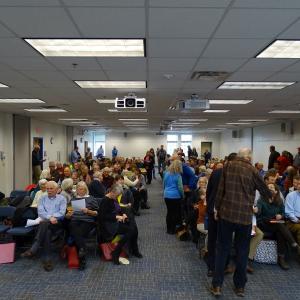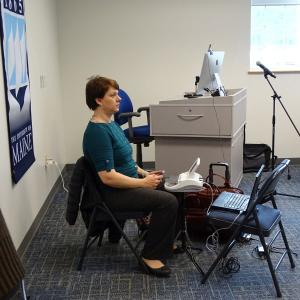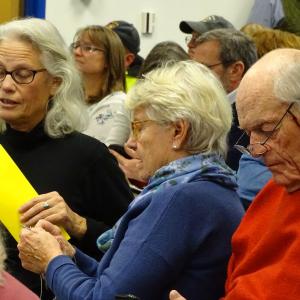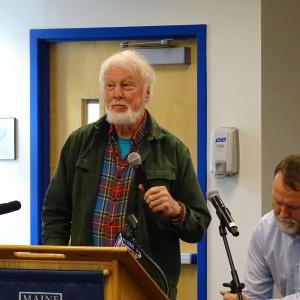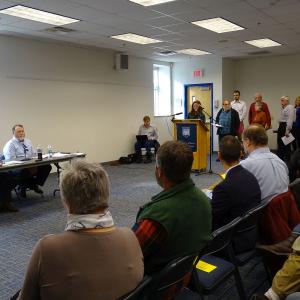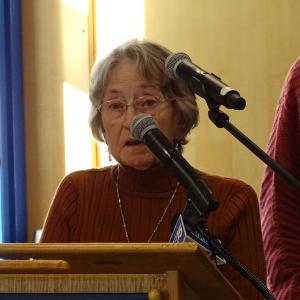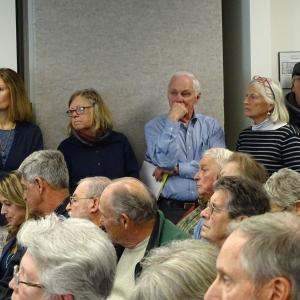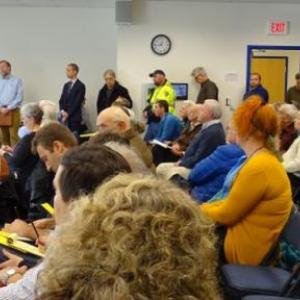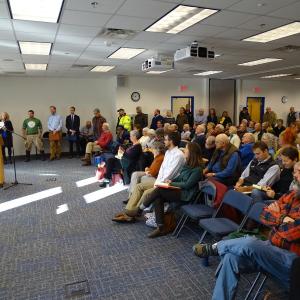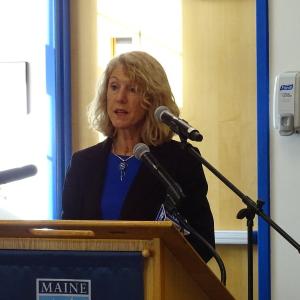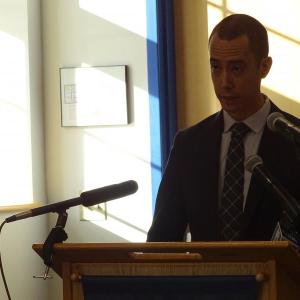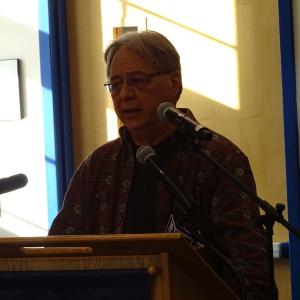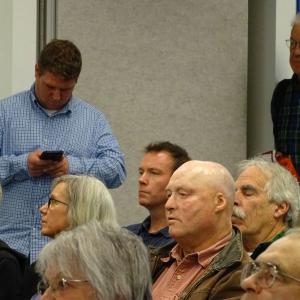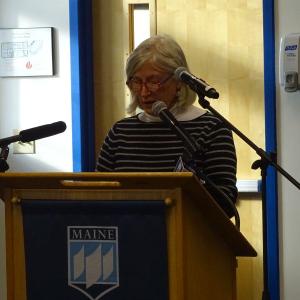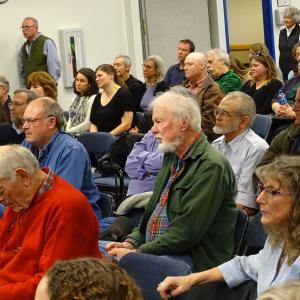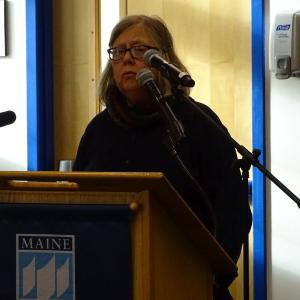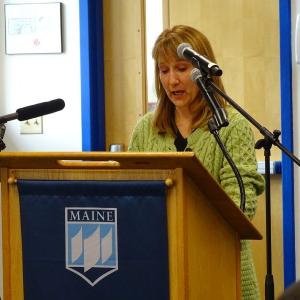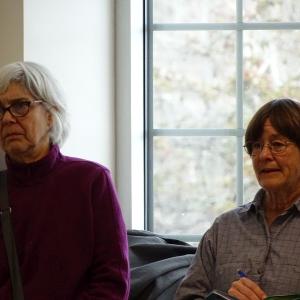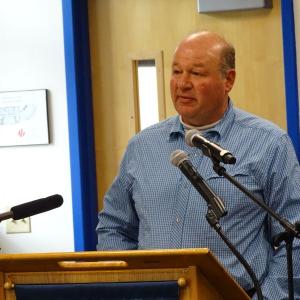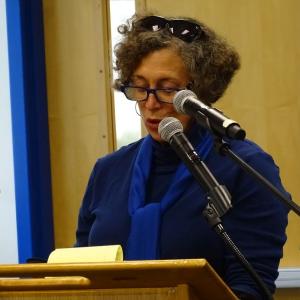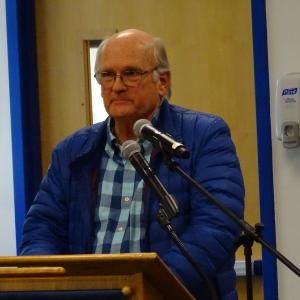DOT mulls overwhelming criticism of controversial Tariff No. 8 while Islesboro awaits Commissioner’s say
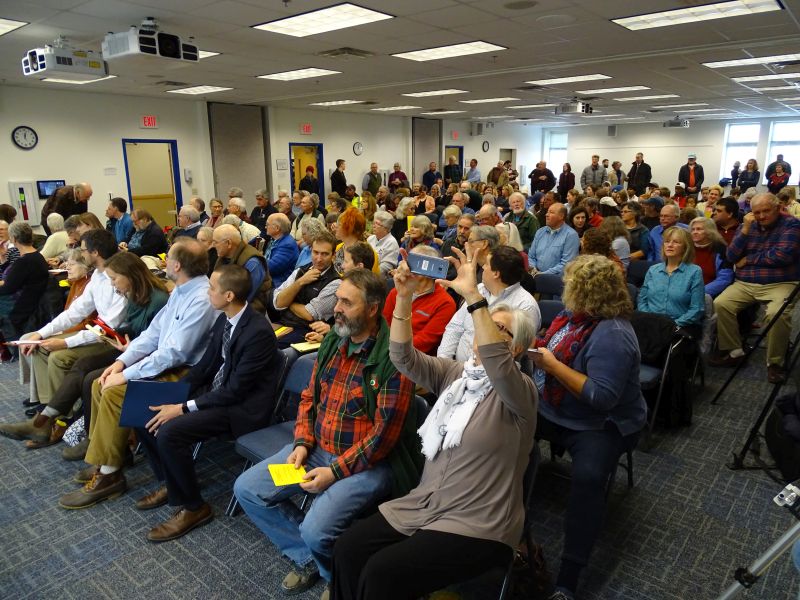 The meeting room at the Hutchinson Center in Belfast filled Nov. 28 with many Islesboro residents, politicians, and several residents of other islands, all in support of Islesboro, or more thoughtful consideration of ferry tariffs. (photo by Erica Thoms)
The meeting room at the Hutchinson Center in Belfast filled Nov. 28 with many Islesboro residents, politicians, and several residents of other islands, all in support of Islesboro, or more thoughtful consideration of ferry tariffs. (photo by Erica Thoms)
 The room at the University of Maine Hutchinson Center Nov. 28. (photo by Erica Thoms)
The room at the University of Maine Hutchinson Center Nov. 28. (photo by Erica Thoms)
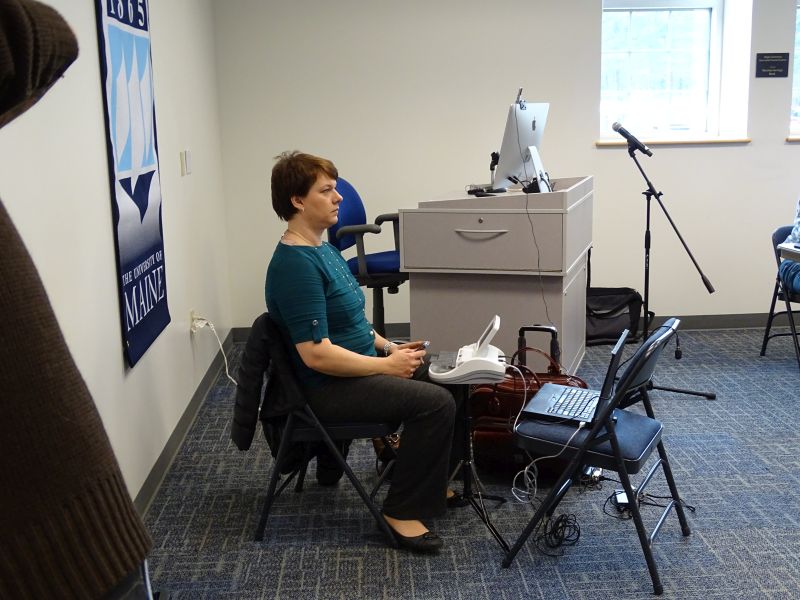 A court reporter painstakingly took minutes of the meeting. (photo by Erica Thoms)
A court reporter painstakingly took minutes of the meeting. (photo by Erica Thoms)
 Mark Higgins, of the Maine State Ferry Service, and Jim Billings, chief counsel for the DOT’s Office of Legal Affairs. (Photo by Erica Thoms)
Mark Higgins, of the Maine State Ferry Service, and Jim Billings, chief counsel for the DOT’s Office of Legal Affairs. (Photo by Erica Thoms)
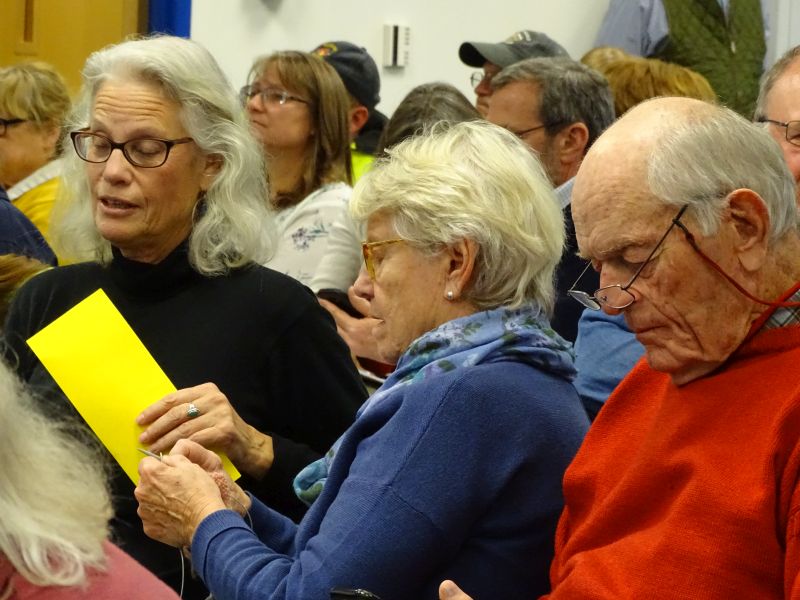 (photo by Erica Thoms)
(photo by Erica Thoms)
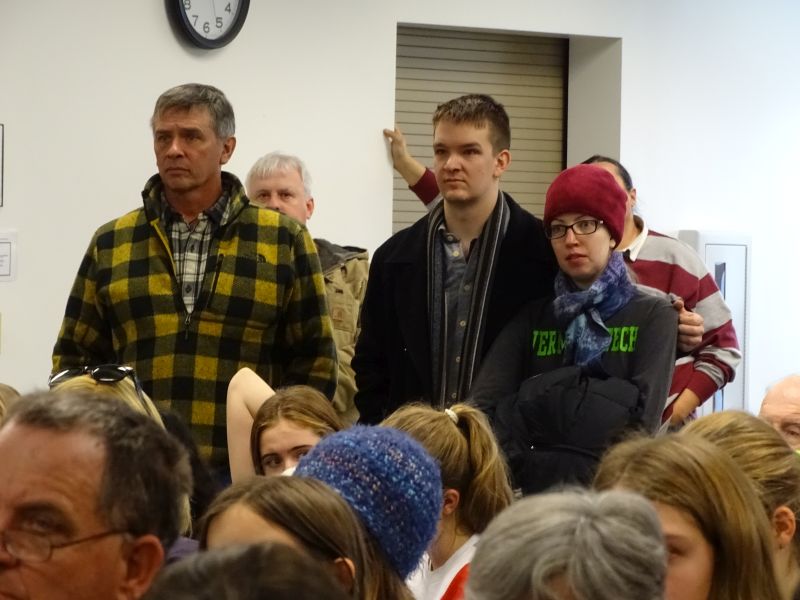 (photo by Erica Thoms)
(photo by Erica Thoms)
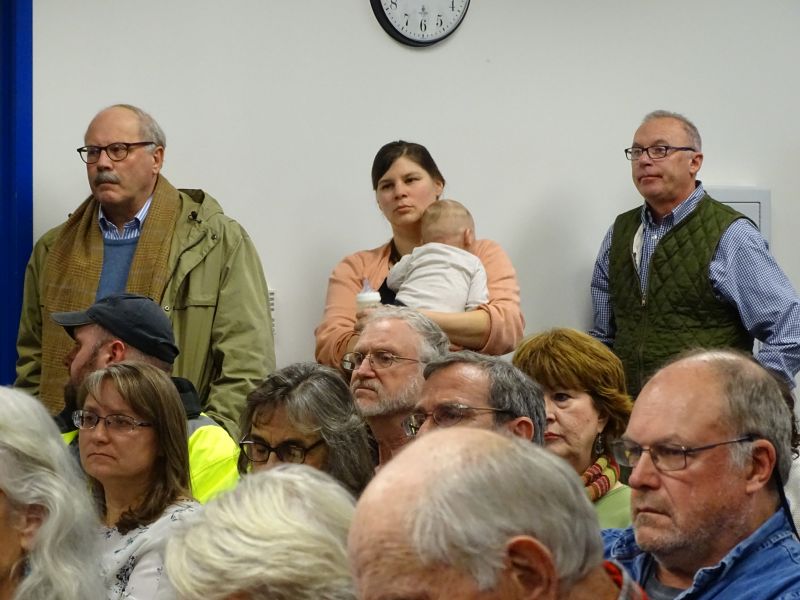 Concerned citizens wait for their chance to speak. (photo by Erica Thoms)
Concerned citizens wait for their chance to speak. (photo by Erica Thoms)
 (photo by Erica Thoms)
(photo by Erica Thoms)
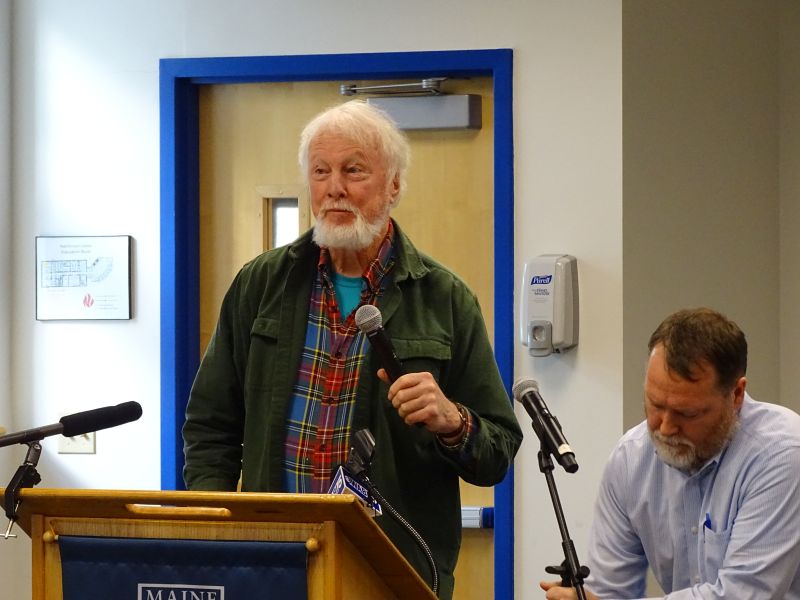 Duncan Vaughn, of Frenchboro, was the lone person who spoke in favor of Tariff No. 8. (photo by Erica Thoms)
Duncan Vaughn, of Frenchboro, was the lone person who spoke in favor of Tariff No. 8. (photo by Erica Thoms)
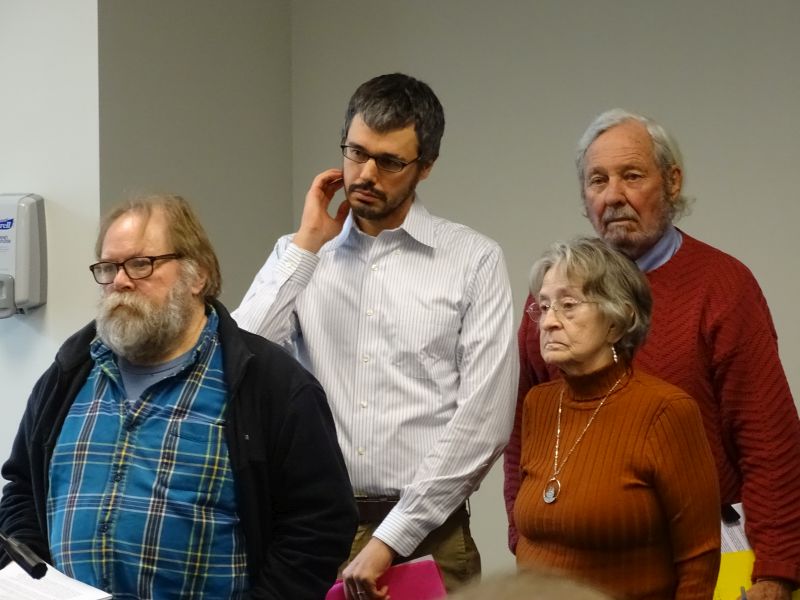 Speakers wait for their chance at the podium. (photo by Erica Thoms)
Speakers wait for their chance at the podium. (photo by Erica Thoms)
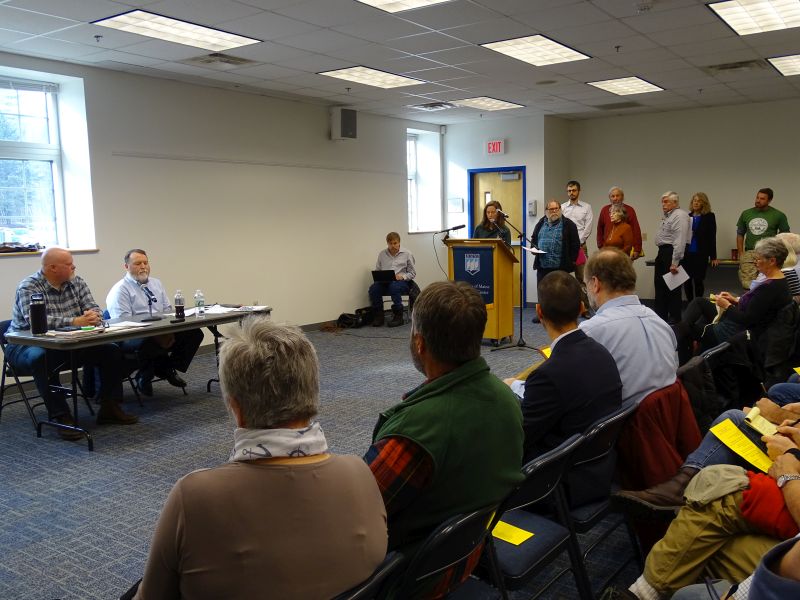 Mary Costigan, who works with the law firm representing the town of Islesboro in the lawsuit against the Department of Transportation. (photo by Erica Thoms)
Mary Costigan, who works with the law firm representing the town of Islesboro in the lawsuit against the Department of Transportation. (photo by Erica Thoms)
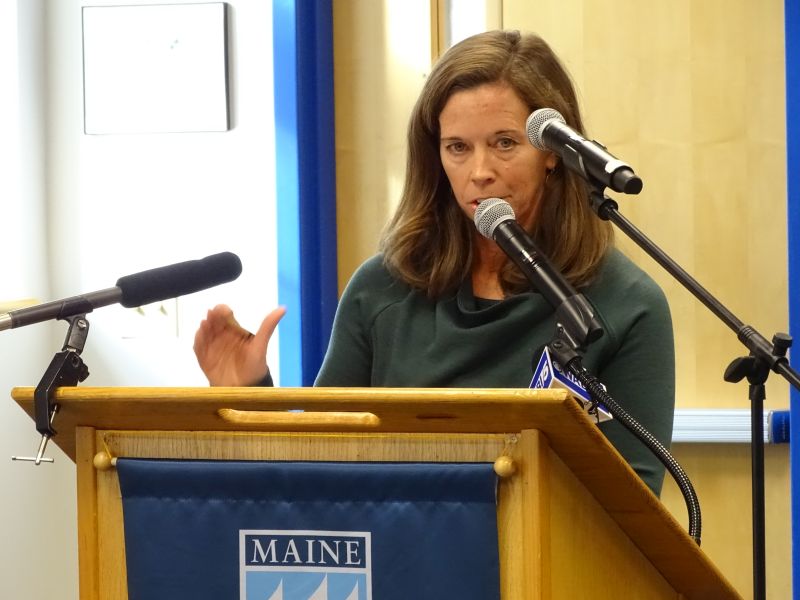 Mary Costigan speaks against Tariff 8. (photo by Erica Thoms)
Mary Costigan speaks against Tariff 8. (photo by Erica Thoms)
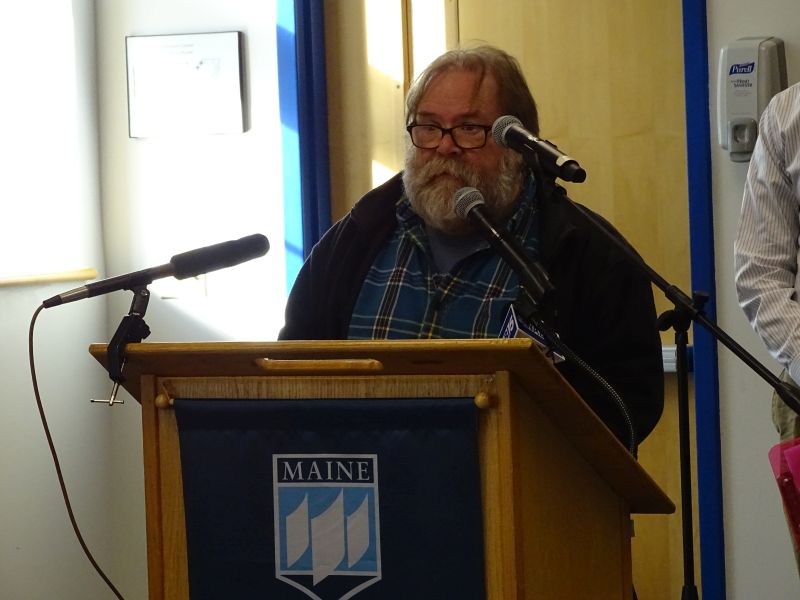 Neal Harkness, who represents Belfast’s second ward in the city council, read a letter the City of Belfast wrote to the Maine DOT in support of Islesboro. Harkness talked about the special bond shared between Belfast and Islesboro and the impacts the rate hike would have on both. (photo by Erica Thoms)
Neal Harkness, who represents Belfast’s second ward in the city council, read a letter the City of Belfast wrote to the Maine DOT in support of Islesboro. Harkness talked about the special bond shared between Belfast and Islesboro and the impacts the rate hike would have on both. (photo by Erica Thoms)
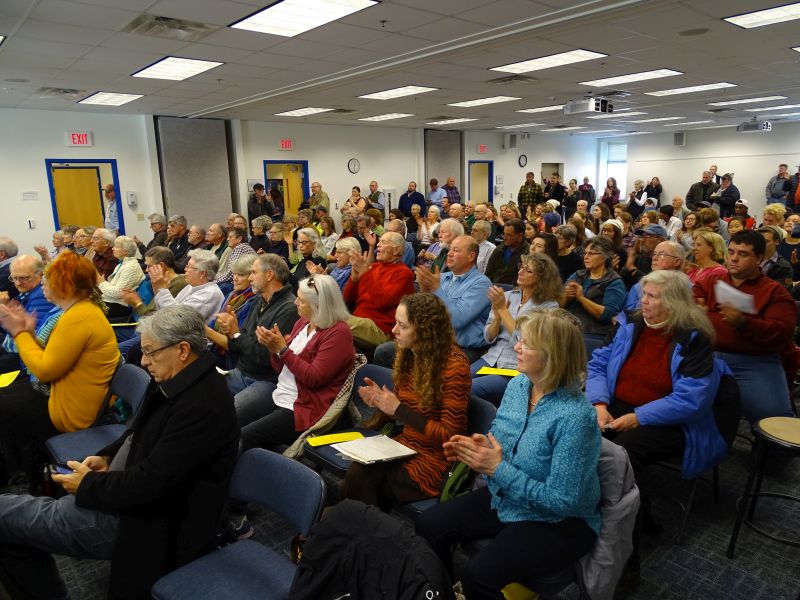 The crowd applauds Harkness’ words. (photo by Erica Thoms)
The crowd applauds Harkness’ words. (photo by Erica Thoms)
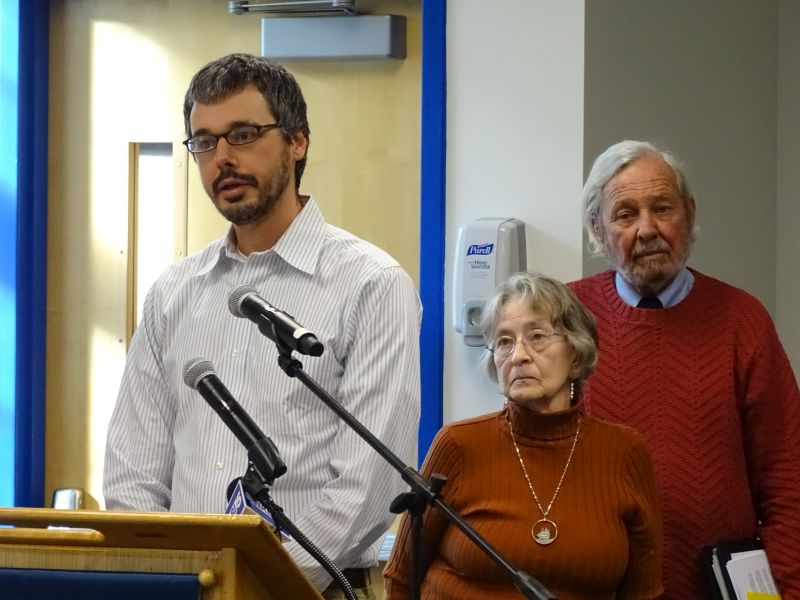 Gabriel Pendleton, a member of the Islesboro Select Board, talked about the significant loss of ridership the ferry has suffered post-rate-hike. (photo by Erica Thoms)
Gabriel Pendleton, a member of the Islesboro Select Board, talked about the significant loss of ridership the ferry has suffered post-rate-hike. (photo by Erica Thoms)
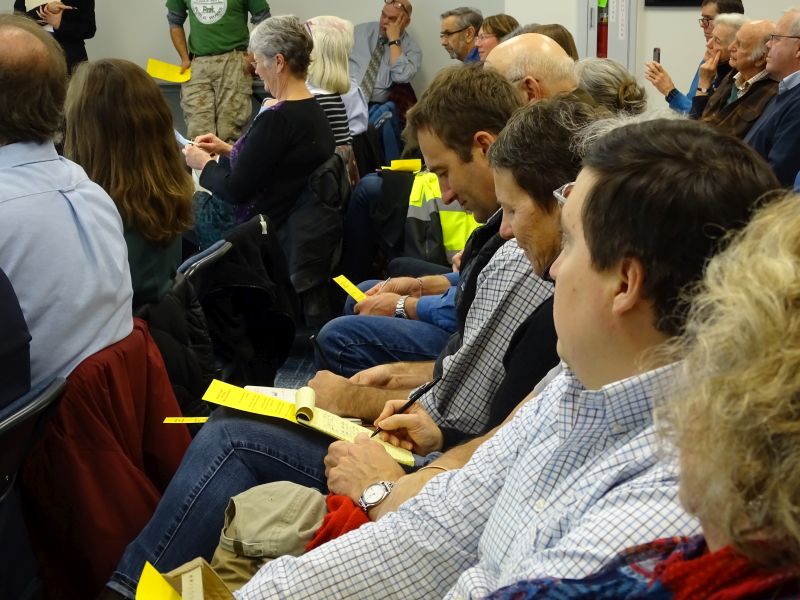 (photo by Erica Thoms)
(photo by Erica Thoms)
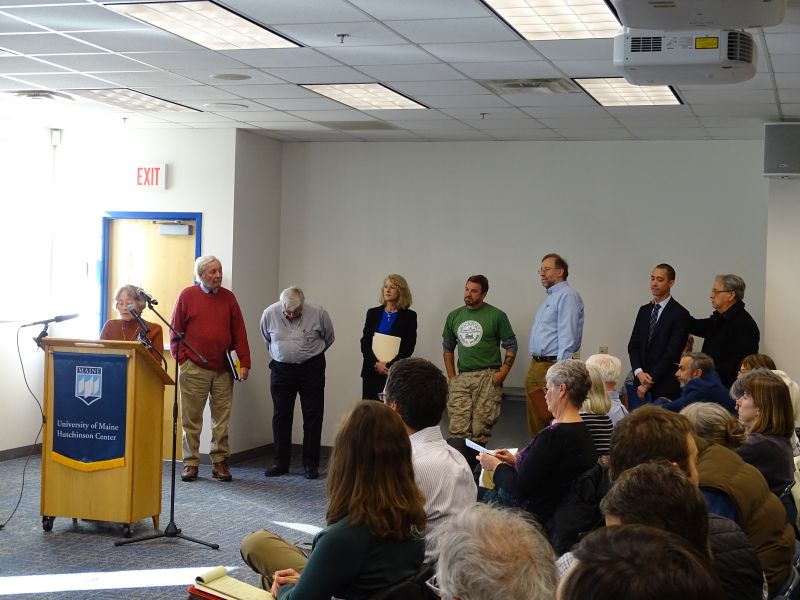 The queue behind Waldo County District 1 Commissioner Betty Johnson. (photo by Erica Thoms)
The queue behind Waldo County District 1 Commissioner Betty Johnson. (photo by Erica Thoms)
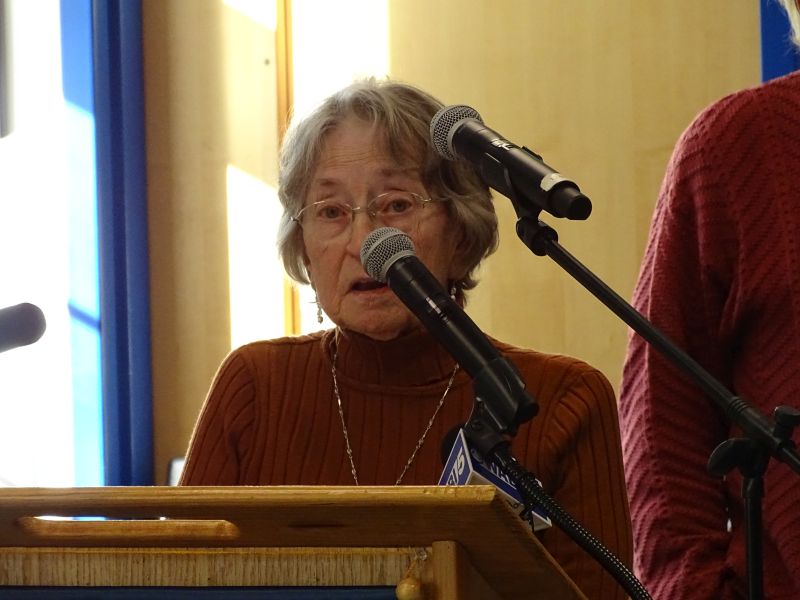 Betty Johnson speaks in opposition to Tariff No. 8. (photo by Erica Thoms)
Betty Johnson speaks in opposition to Tariff No. 8. (photo by Erica Thoms)
 Richard Degrasse, a retired regulator and Islesboro resident, spoke in opposition of the rate increases. (photo by Erica Thoms)
Richard Degrasse, a retired regulator and Islesboro resident, spoke in opposition of the rate increases. (photo by Erica Thoms)
 Citizens wait for their chance to speak. (photo by Erica Thoms)
Citizens wait for their chance to speak. (photo by Erica Thoms)
 Degrasse suggested an audit should be done to learn the cost of service per route. (photo by Erica Thoms)
Degrasse suggested an audit should be done to learn the cost of service per route. (photo by Erica Thoms)
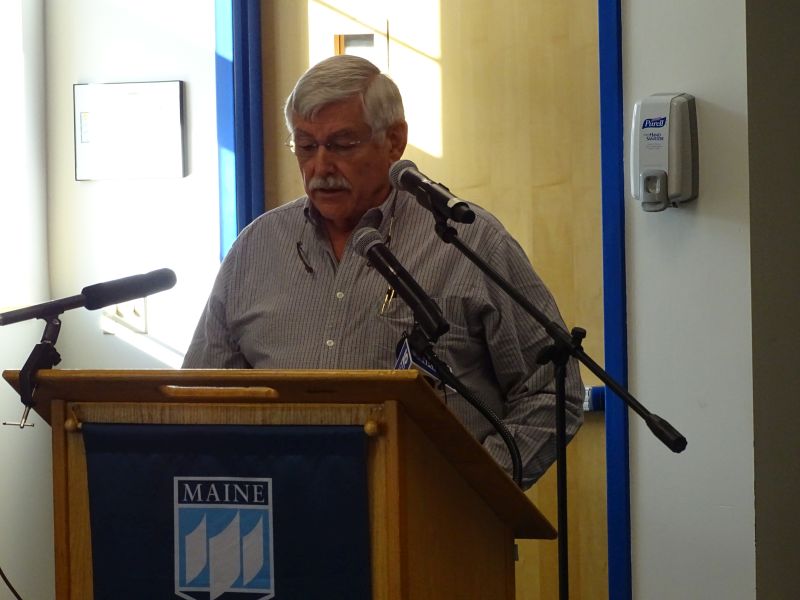 Selectman and captain of Emergency Medical Services on Islesboro Phil Seymour takes his turn at the podium. (photo by Erica Thoms)
Selectman and captain of Emergency Medical Services on Islesboro Phil Seymour takes his turn at the podium. (photo by Erica Thoms)
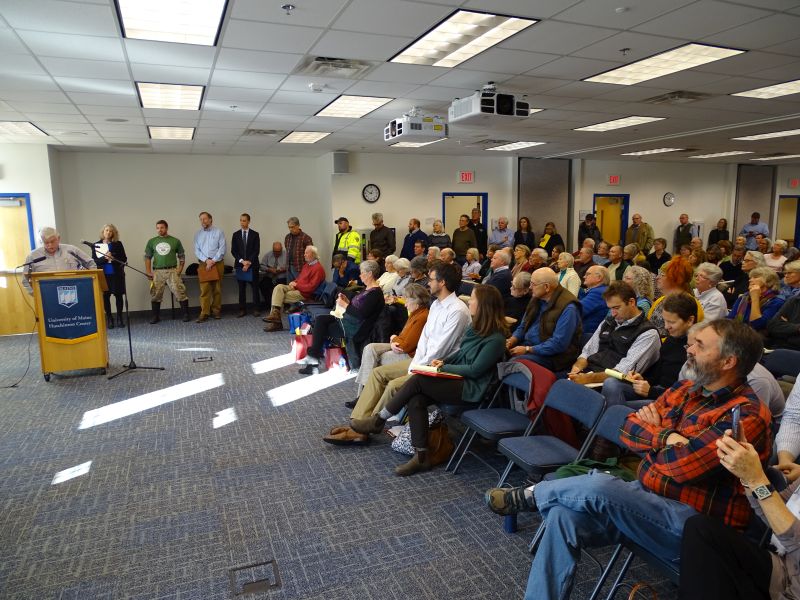 (photo by Erica Thoms)
(photo by Erica Thoms)
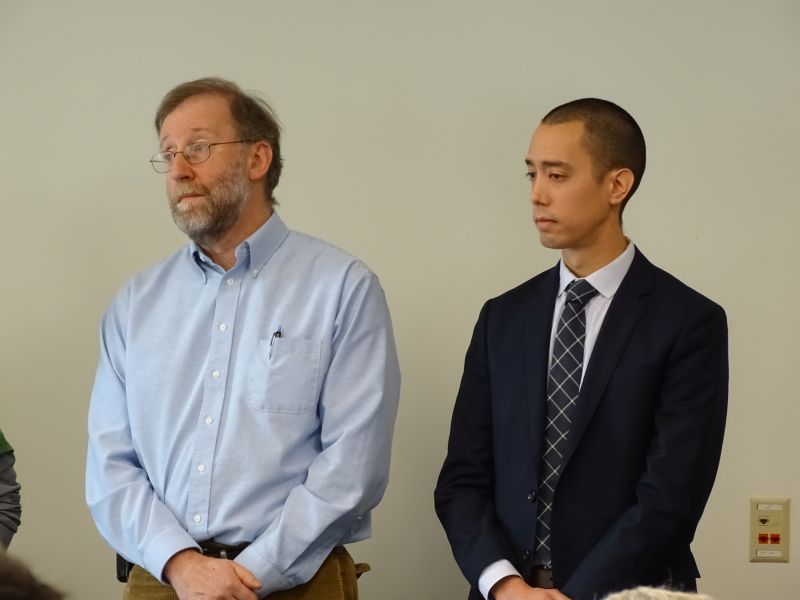 Rockport Select Board member Ken McKinley and Lincolnville Select Board member Josh Gerritsen deliver their towns’ support of Islesboro. (Photo by Erica Thoms)
Rockport Select Board member Ken McKinley and Lincolnville Select Board member Josh Gerritsen deliver their towns’ support of Islesboro. (Photo by Erica Thoms)
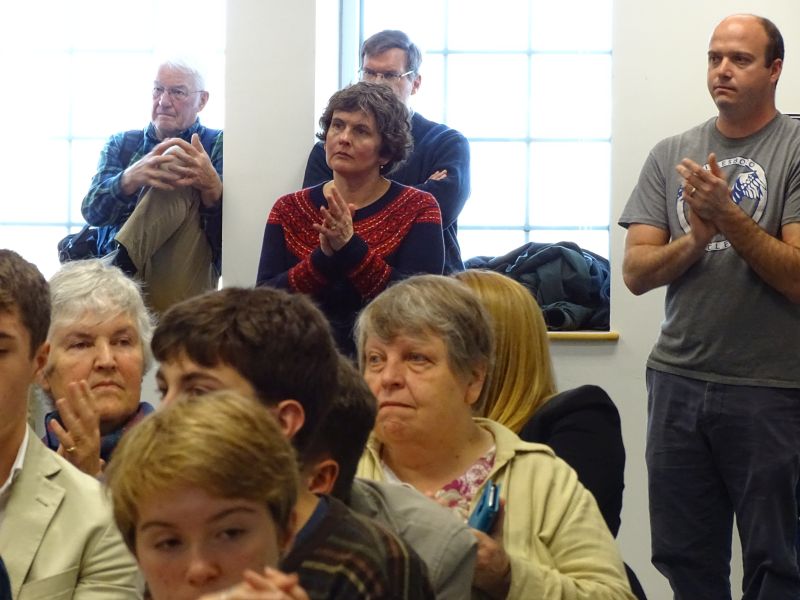 (photo by Erica Thoms)
(photo by Erica Thoms)
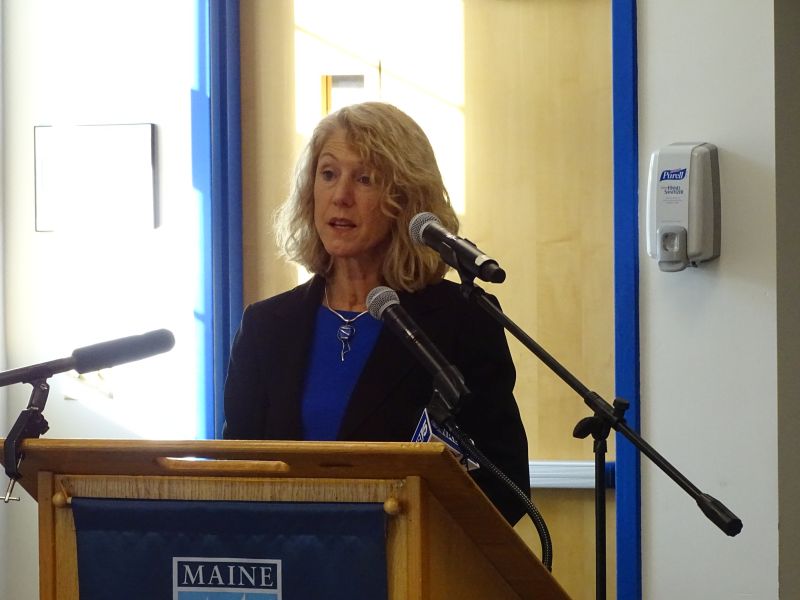 Maine House of Representatives candidate elect Vicki Doudera speaks at the DOT hearing. (photo by Erica Thoms)
Maine House of Representatives candidate elect Vicki Doudera speaks at the DOT hearing. (photo by Erica Thoms)
 Maine Representative Owen Casas, I-Rockport, speaks against Tariff No. 8. (photo by Erica Thoms)
Maine Representative Owen Casas, I-Rockport, speaks against Tariff No. 8. (photo by Erica Thoms)
 (photo by Erica Thoms)
(photo by Erica Thoms)
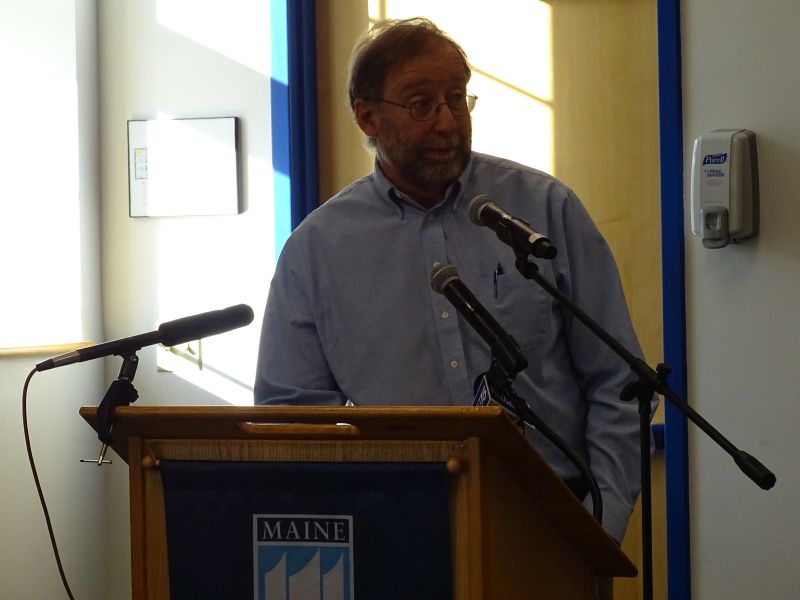 Ken McKinley, of Rockport, addresses the room. (photo by Erica Thoms)
Ken McKinley, of Rockport, addresses the room. (photo by Erica Thoms)
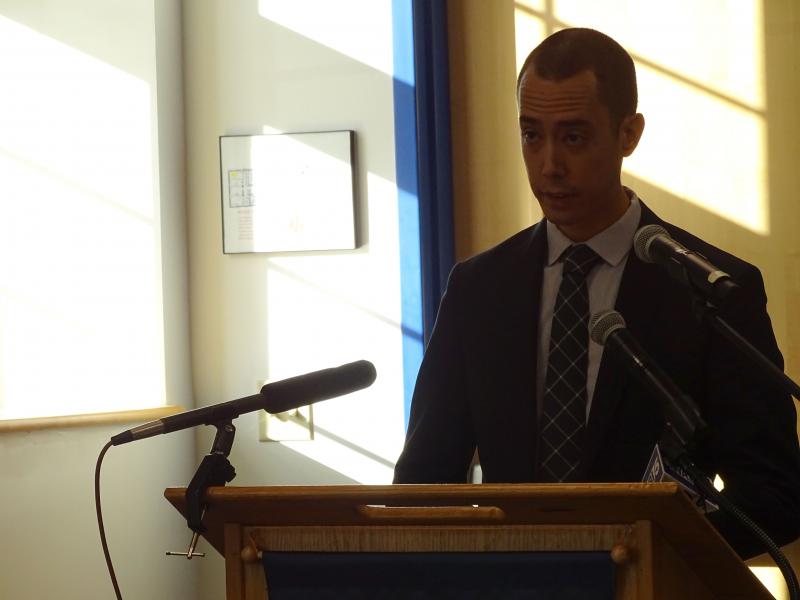 Lincolnville selectman Josh Gerritsen speaks to the crowd. (photo by Erica Thoms)
Lincolnville selectman Josh Gerritsen speaks to the crowd. (photo by Erica Thoms)
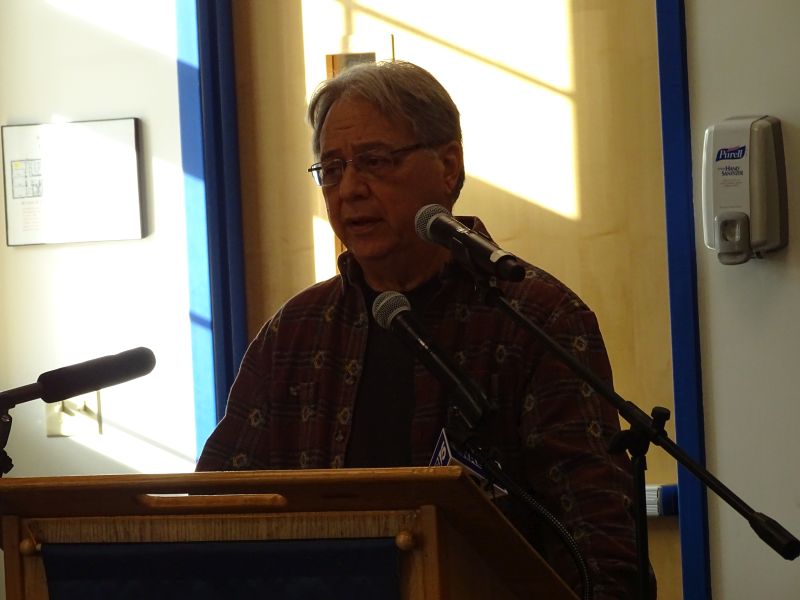 Bob Falciani, chairman of the Camden Select Board. (photo by Erica Thoms)
Bob Falciani, chairman of the Camden Select Board. (photo by Erica Thoms)
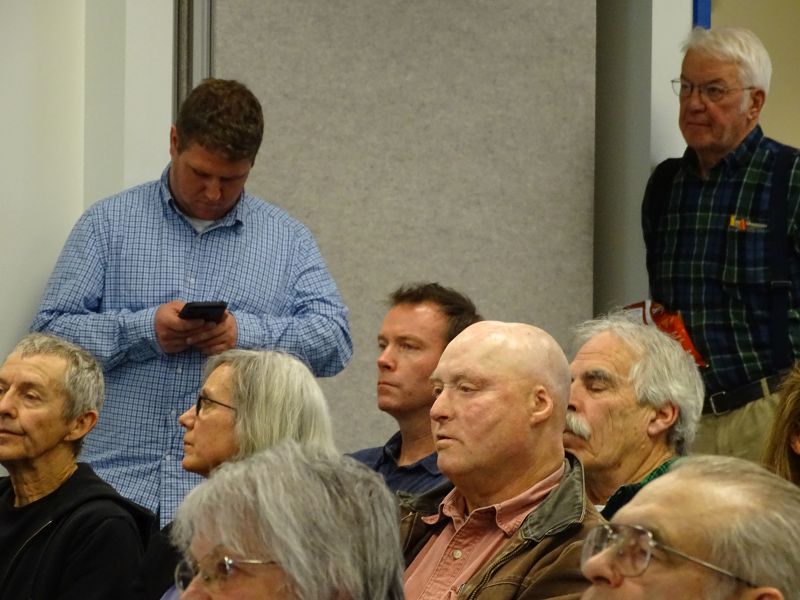 (photo by Erica Thoms)
(photo by Erica Thoms)
 Jordy Watson, of Islesboro, speaks out against Tariff No. 8. (photo by Erica Thoms)
Jordy Watson, of Islesboro, speaks out against Tariff No. 8. (photo by Erica Thoms)
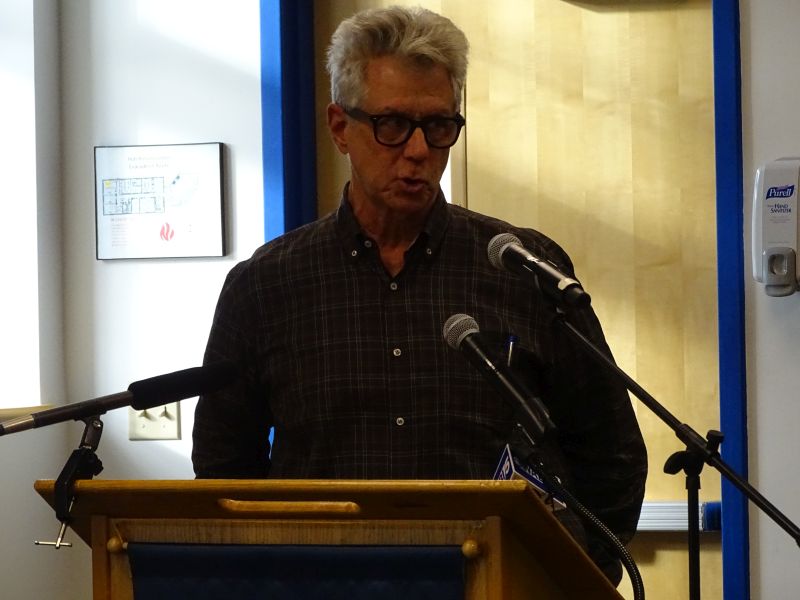 Roger Heinan, who moved to Islesboro in the 90s, takes to the podium. (photo by Erica Thoms)
Roger Heinan, who moved to Islesboro in the 90s, takes to the podium. (photo by Erica Thoms)
 (photo by Erica Thoms)
(photo by Erica Thoms)
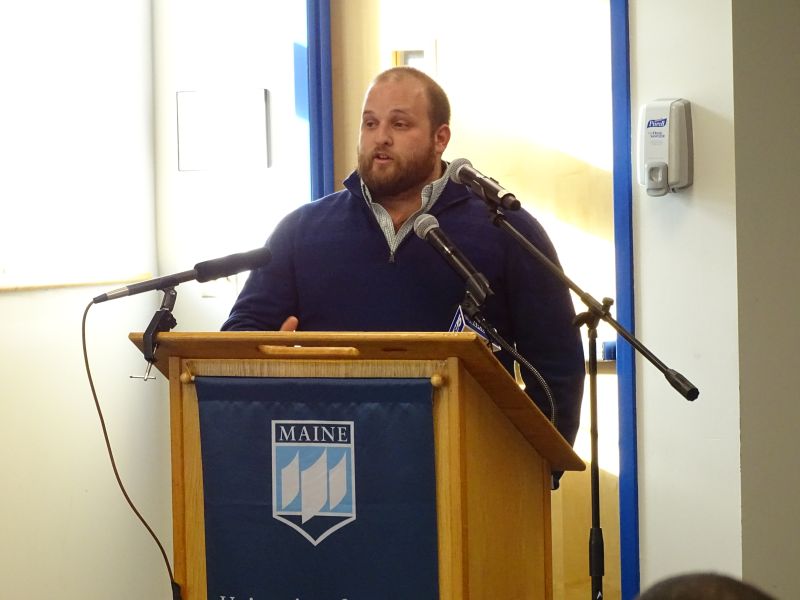 Andrew Doyle, the town manager in Vinalhaven, speaks in support of Islesboro. (photo by Erica Thoms)
Andrew Doyle, the town manager in Vinalhaven, speaks in support of Islesboro. (photo by Erica Thoms)
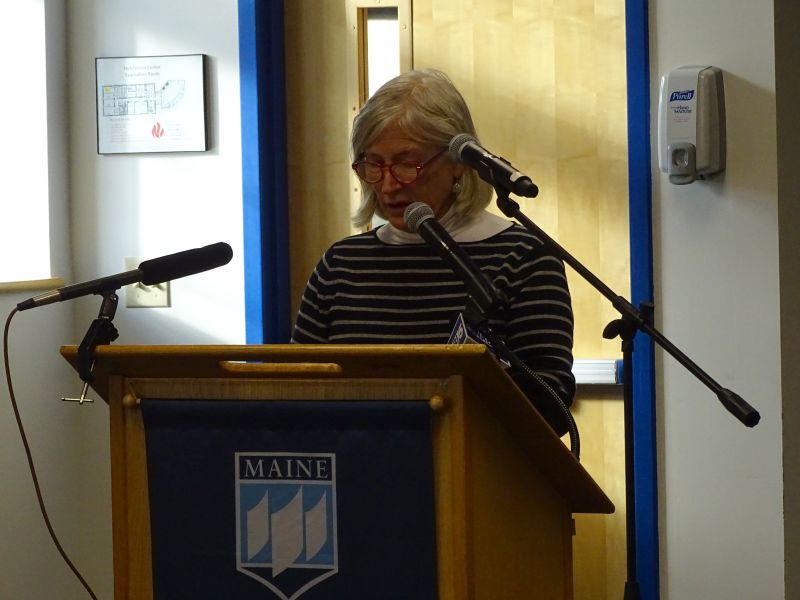 Islesboro resident Nancy Alexander speaks. (photo by Erica Thoms)
Islesboro resident Nancy Alexander speaks. (photo by Erica Thoms)
 Doug Welldon, who has family roots on the island, speaks to the crowd. (photo by Erica Thoms)
Doug Welldon, who has family roots on the island, speaks to the crowd. (photo by Erica Thoms)
 District 11 Senator Elect Erin Herbig listens amongst the crowd during the meeting. (photo by Erica Thoms)
District 11 Senator Elect Erin Herbig listens amongst the crowd during the meeting. (photo by Erica Thoms)
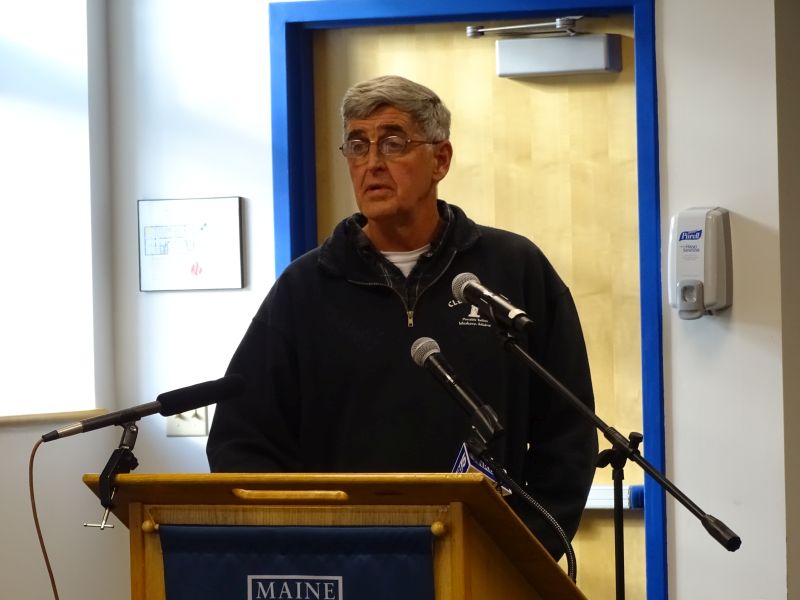 Paul Hatch, who owns a construction company on Islesboro talked about the increased cost to do business. Hatch said the price to take two business trucks to the mainlaind per day has grown from $66,240 for a year of trips, to over $99k post rate-hike. (photo by Erica Thoms)
Paul Hatch, who owns a construction company on Islesboro talked about the increased cost to do business. Hatch said the price to take two business trucks to the mainlaind per day has grown from $66,240 for a year of trips, to over $99k post rate-hike. (photo by Erica Thoms)
 William Warren, a real estate broker on Islesboro for the last 30 years and resident of the island, expresses his concerns. (photo by Erica Thoms)
William Warren, a real estate broker on Islesboro for the last 30 years and resident of the island, expresses his concerns. (photo by Erica Thoms)
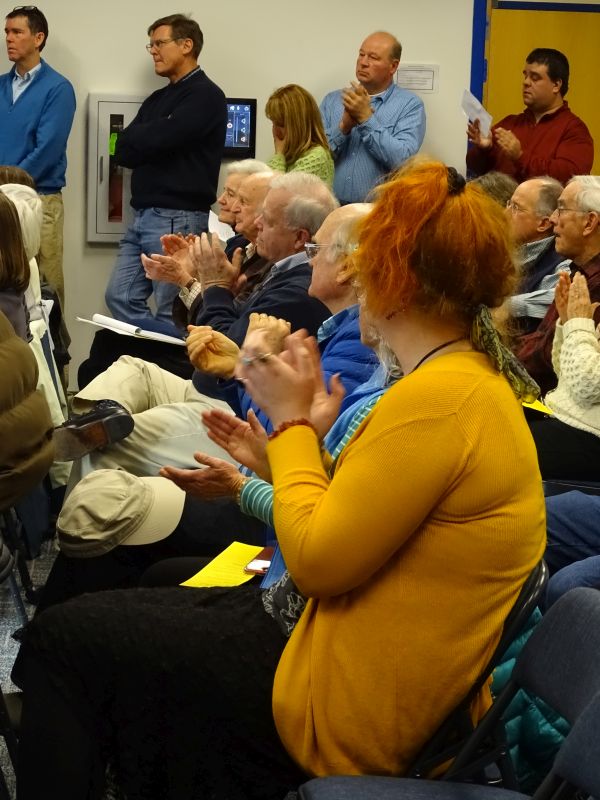 (photo by Erica Thoms)
(photo by Erica Thoms)
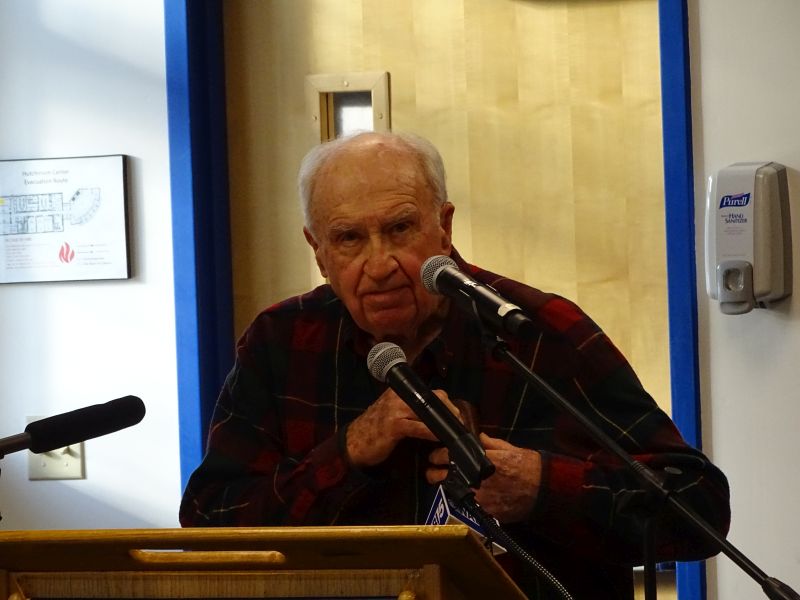 John Mitchell, who said he was born on the island before the ferry service began in 1936, also voiced concerns over Tariff No. 8. (photo by Erica Thoms)
John Mitchell, who said he was born on the island before the ferry service began in 1936, also voiced concerns over Tariff No. 8. (photo by Erica Thoms)
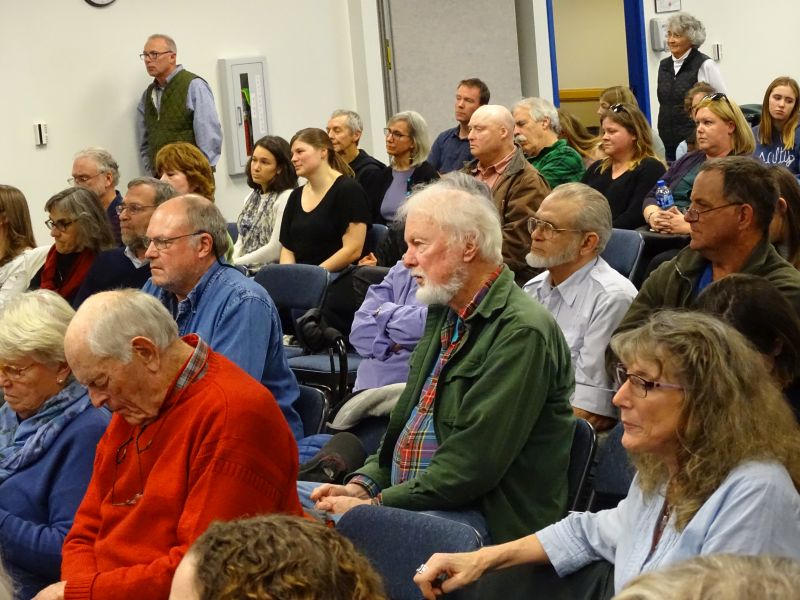 (photo by Erica Thoms)
(photo by Erica Thoms)
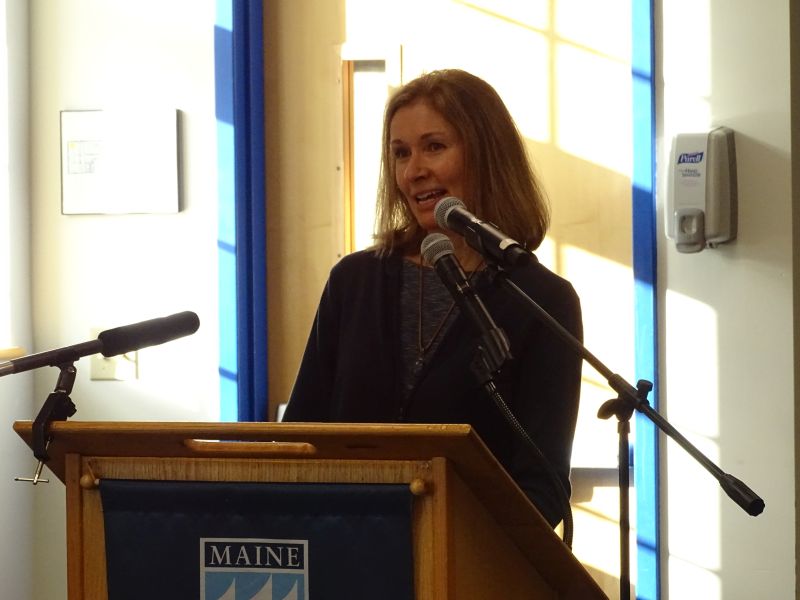 An Islesboro teacher addresses the crowd, which included a number of island students. (photo by Erica Thoms)
An Islesboro teacher addresses the crowd, which included a number of island students. (photo by Erica Thoms)
 (photo by Erica Thoms)
(photo by Erica Thoms)
 (photo by Erica Thoms)
(photo by Erica Thoms)
 (photo by Erica Thoms)
(photo by Erica Thoms)
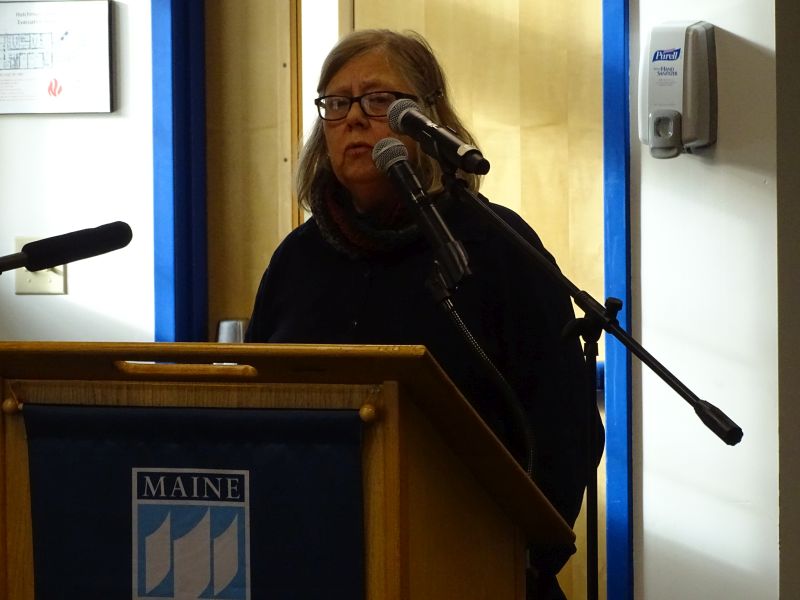 (photo by Erica Thoms)
(photo by Erica Thoms)
 (photo by Erica Thoms)
(photo by Erica Thoms)
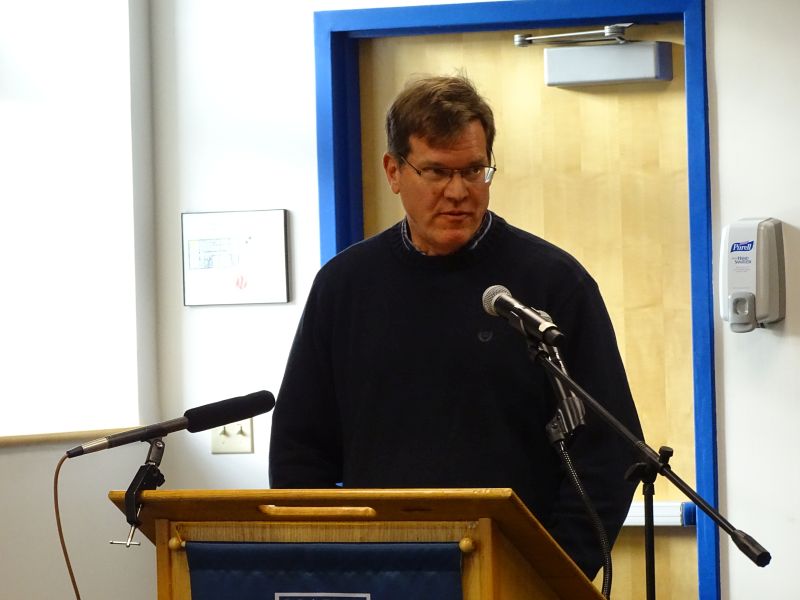 (photo by Erica Thoms)
(photo by Erica Thoms)
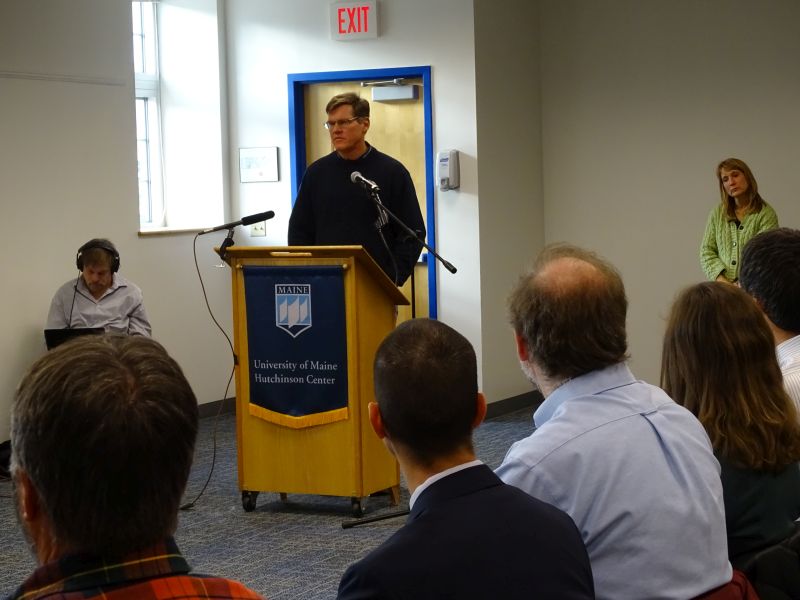 (photo by Erica Thoms)
(photo by Erica Thoms)
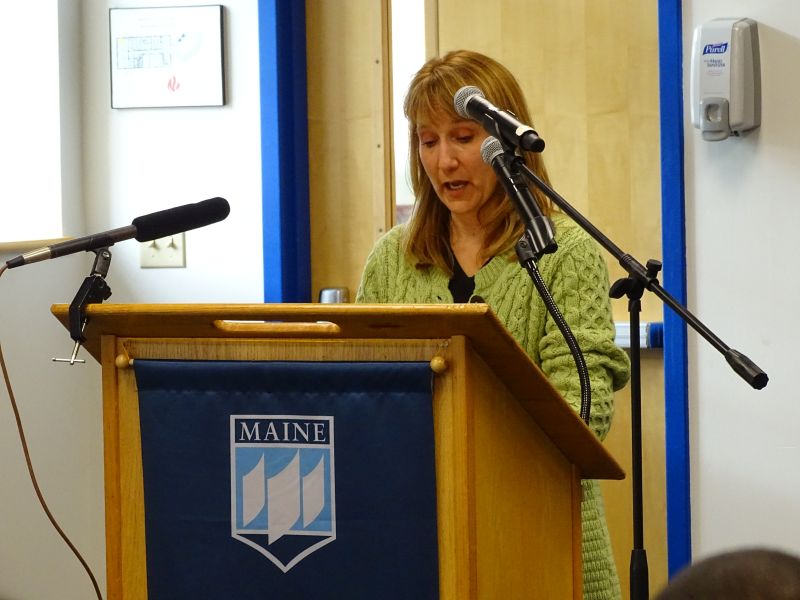 (photo by Erica Thoms)
(photo by Erica Thoms)
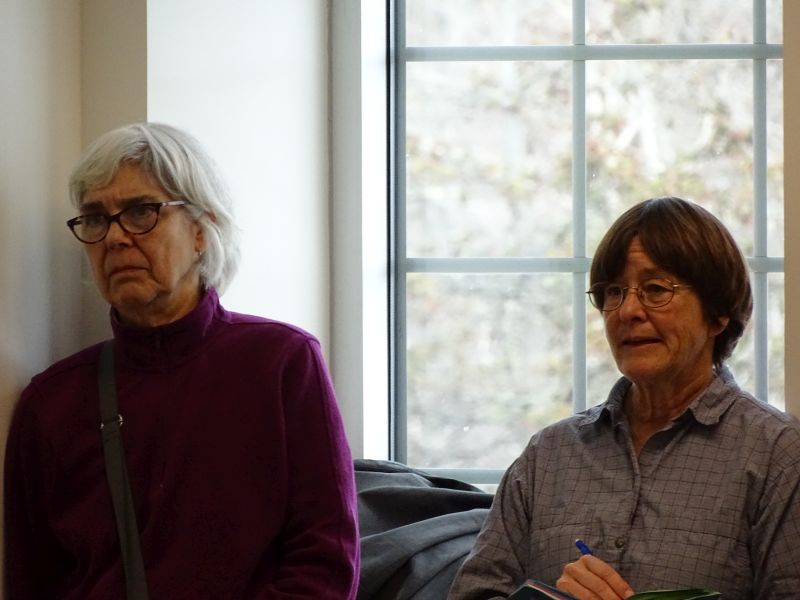 (photo by Erica Thoms)
(photo by Erica Thoms)
 (photo by Erica Thoms)
(photo by Erica Thoms)
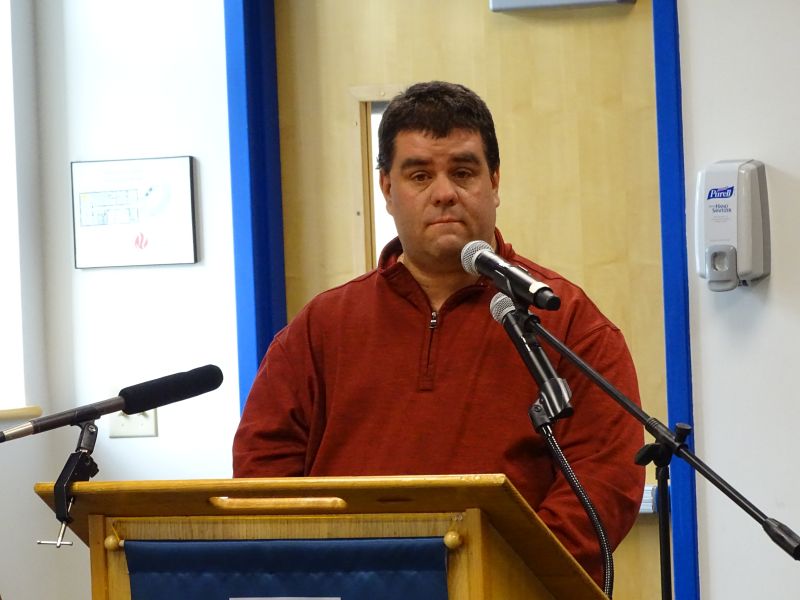 (photo by Erica Thoms)
(photo by Erica Thoms)
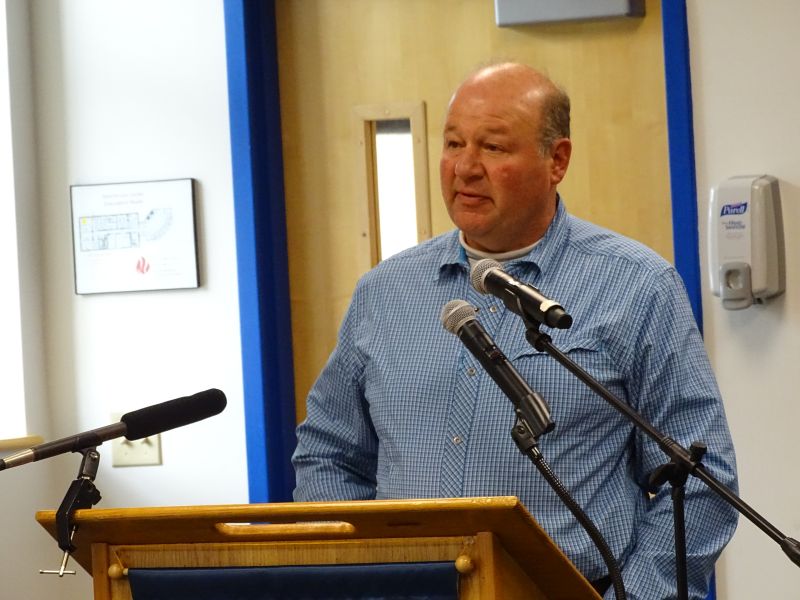 (photo by Erica Thoms)
(photo by Erica Thoms)
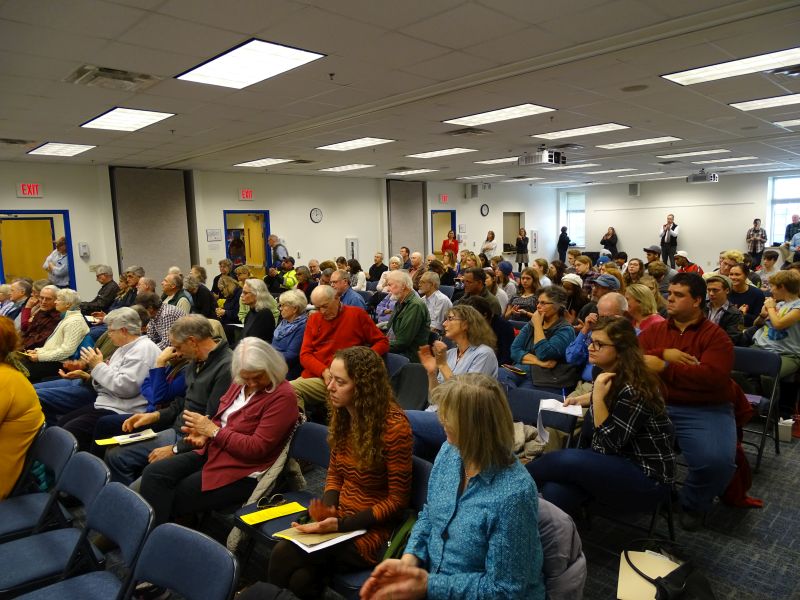 (photo by Erica Thoms)
(photo by Erica Thoms)
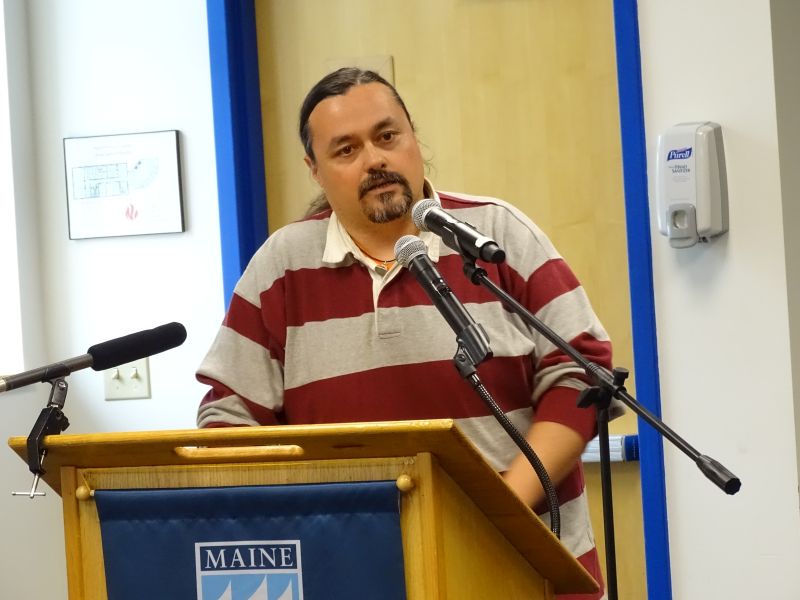 (photo by Erica Thoms)
(photo by Erica Thoms)
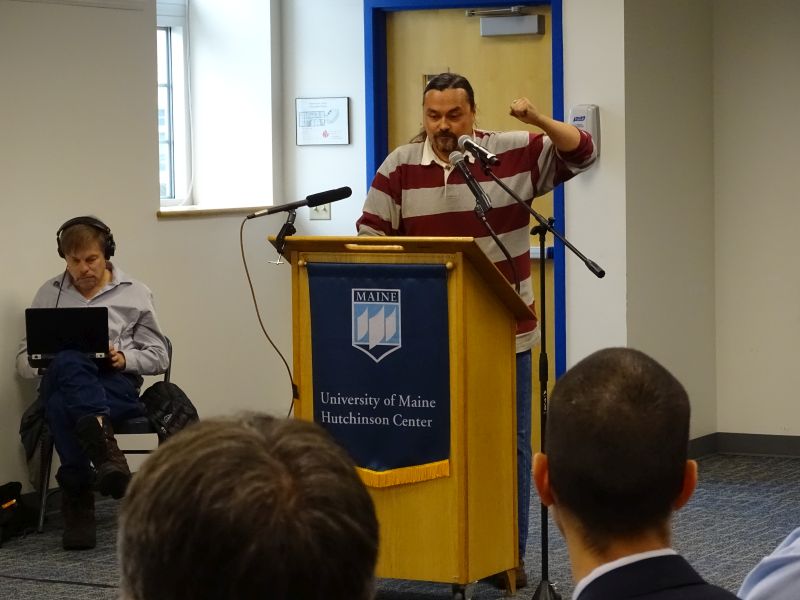 (photo by Erica Thoms)
(photo by Erica Thoms)
 (photo by Erica Thoms)
(photo by Erica Thoms)
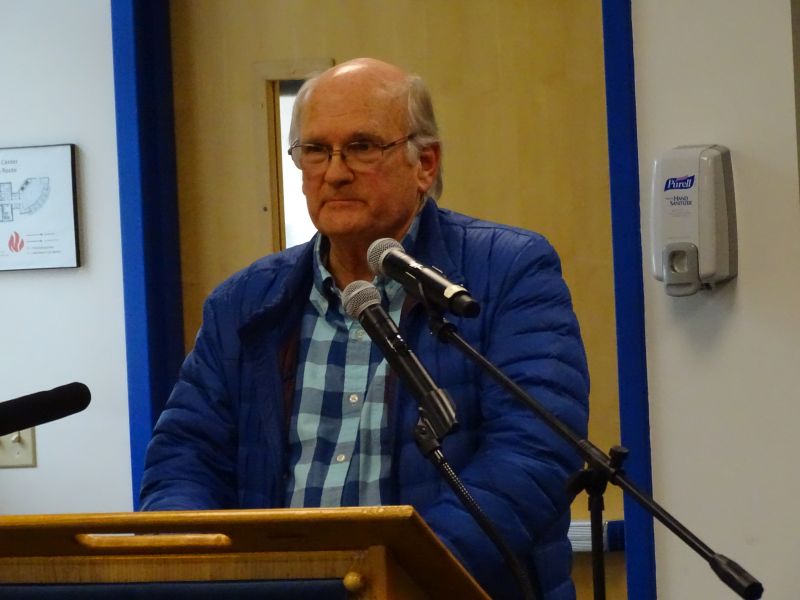 (photo by Erica Thoms)
(photo by Erica Thoms)
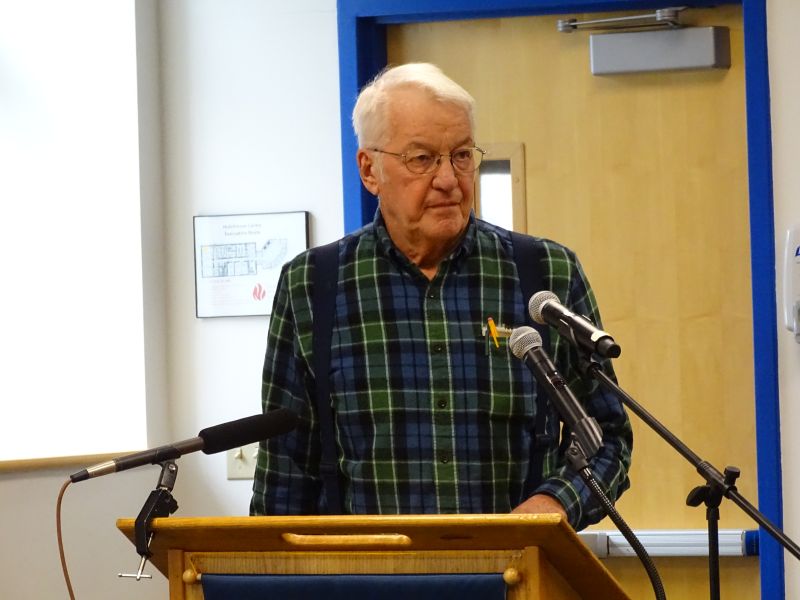 (photo by Erica Thoms)
(photo by Erica Thoms)
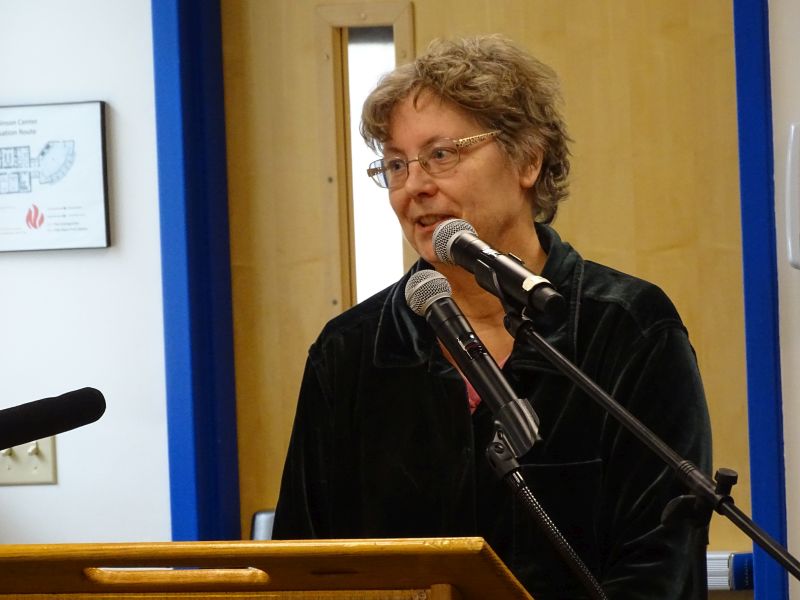 (photo by Erica Thoms)
(photo by Erica Thoms)
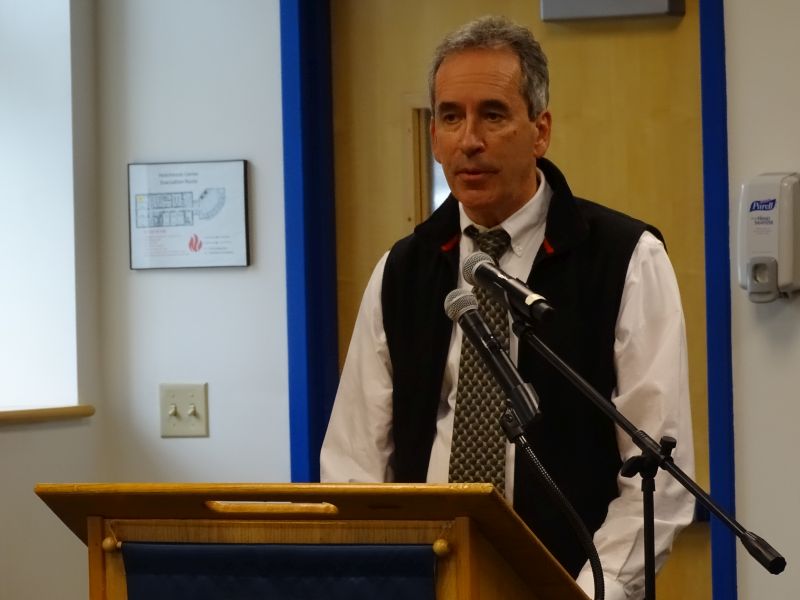 Belfast City Manager Joe Slocum was the last speaker at the meeting. (photo by Erica Thoms)
Belfast City Manager Joe Slocum was the last speaker at the meeting. (photo by Erica Thoms)
 Islesboro residents trekked over to Belfast on two buses and in cars. (Photo by Lynda Clancy)
Islesboro residents trekked over to Belfast on two buses and in cars. (Photo by Lynda Clancy)
 The meeting room at the Hutchinson Center in Belfast filled Nov. 28 with many Islesboro residents, politicians, and several residents of other islands, all in support of Islesboro, or more thoughtful consideration of ferry tariffs. (photo by Erica Thoms)
The meeting room at the Hutchinson Center in Belfast filled Nov. 28 with many Islesboro residents, politicians, and several residents of other islands, all in support of Islesboro, or more thoughtful consideration of ferry tariffs. (photo by Erica Thoms)
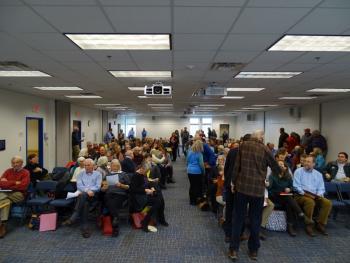 The room at the University of Maine Hutchinson Center Nov. 28. (photo by Erica Thoms)
The room at the University of Maine Hutchinson Center Nov. 28. (photo by Erica Thoms)
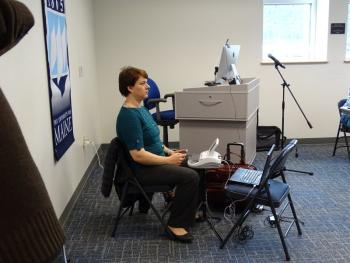 A court reporter painstakingly took minutes of the meeting. (photo by Erica Thoms)
A court reporter painstakingly took minutes of the meeting. (photo by Erica Thoms)
 Mark Higgins, of the Maine State Ferry Service, and Jim Billings, chief counsel for the DOT’s Office of Legal Affairs. (Photo by Erica Thoms)
Mark Higgins, of the Maine State Ferry Service, and Jim Billings, chief counsel for the DOT’s Office of Legal Affairs. (Photo by Erica Thoms)
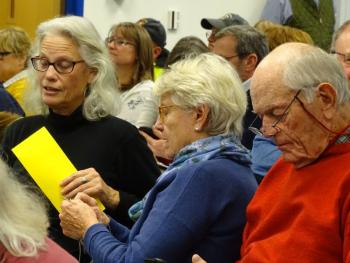 (photo by Erica Thoms)
(photo by Erica Thoms)
 (photo by Erica Thoms)
(photo by Erica Thoms)
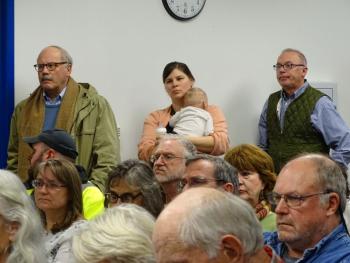 Concerned citizens wait for their chance to speak. (photo by Erica Thoms)
Concerned citizens wait for their chance to speak. (photo by Erica Thoms)
 (photo by Erica Thoms)
(photo by Erica Thoms)
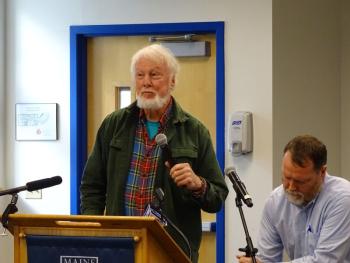 Duncan Vaughn, of Frenchboro, was the lone person who spoke in favor of Tariff No. 8. (photo by Erica Thoms)
Duncan Vaughn, of Frenchboro, was the lone person who spoke in favor of Tariff No. 8. (photo by Erica Thoms)
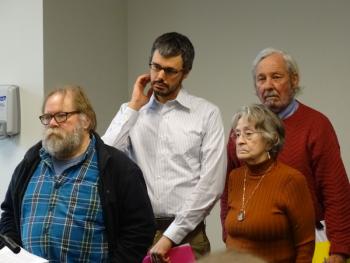 Speakers wait for their chance at the podium. (photo by Erica Thoms)
Speakers wait for their chance at the podium. (photo by Erica Thoms)
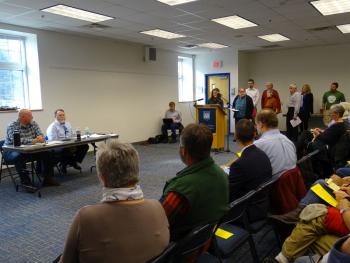 Mary Costigan, who works with the law firm representing the town of Islesboro in the lawsuit against the Department of Transportation. (photo by Erica Thoms)
Mary Costigan, who works with the law firm representing the town of Islesboro in the lawsuit against the Department of Transportation. (photo by Erica Thoms)
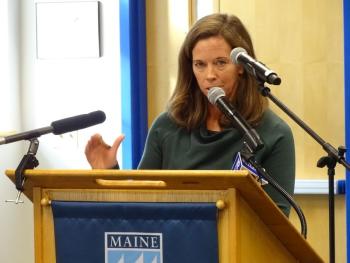 Mary Costigan speaks against Tariff 8. (photo by Erica Thoms)
Mary Costigan speaks against Tariff 8. (photo by Erica Thoms)
 Neal Harkness, who represents Belfast’s second ward in the city council, read a letter the City of Belfast wrote to the Maine DOT in support of Islesboro. Harkness talked about the special bond shared between Belfast and Islesboro and the impacts the rate hike would have on both. (photo by Erica Thoms)
Neal Harkness, who represents Belfast’s second ward in the city council, read a letter the City of Belfast wrote to the Maine DOT in support of Islesboro. Harkness talked about the special bond shared between Belfast and Islesboro and the impacts the rate hike would have on both. (photo by Erica Thoms)
 The crowd applauds Harkness’ words. (photo by Erica Thoms)
The crowd applauds Harkness’ words. (photo by Erica Thoms)
 Gabriel Pendleton, a member of the Islesboro Select Board, talked about the significant loss of ridership the ferry has suffered post-rate-hike. (photo by Erica Thoms)
Gabriel Pendleton, a member of the Islesboro Select Board, talked about the significant loss of ridership the ferry has suffered post-rate-hike. (photo by Erica Thoms)
 (photo by Erica Thoms)
(photo by Erica Thoms)
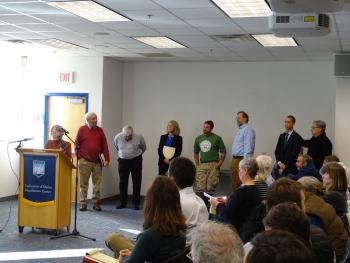 The queue behind Waldo County District 1 Commissioner Betty Johnson. (photo by Erica Thoms)
The queue behind Waldo County District 1 Commissioner Betty Johnson. (photo by Erica Thoms)
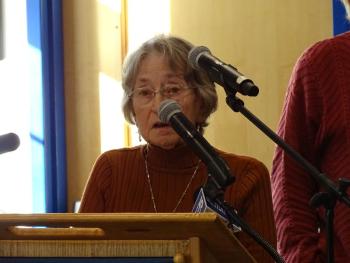 Betty Johnson speaks in opposition to Tariff No. 8. (photo by Erica Thoms)
Betty Johnson speaks in opposition to Tariff No. 8. (photo by Erica Thoms)
 Richard Degrasse, a retired regulator and Islesboro resident, spoke in opposition of the rate increases. (photo by Erica Thoms)
Richard Degrasse, a retired regulator and Islesboro resident, spoke in opposition of the rate increases. (photo by Erica Thoms)
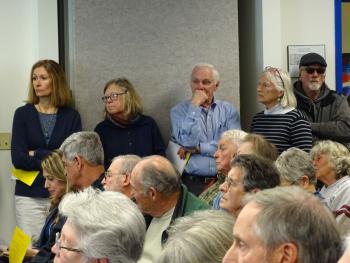 Citizens wait for their chance to speak. (photo by Erica Thoms)
Citizens wait for their chance to speak. (photo by Erica Thoms)
 Degrasse suggested an audit should be done to learn the cost of service per route. (photo by Erica Thoms)
Degrasse suggested an audit should be done to learn the cost of service per route. (photo by Erica Thoms)
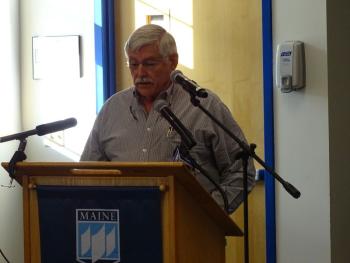 Selectman and captain of Emergency Medical Services on Islesboro Phil Seymour takes his turn at the podium. (photo by Erica Thoms)
Selectman and captain of Emergency Medical Services on Islesboro Phil Seymour takes his turn at the podium. (photo by Erica Thoms)
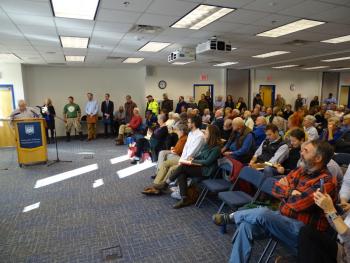 (photo by Erica Thoms)
(photo by Erica Thoms)
 Rockport Select Board member Ken McKinley and Lincolnville Select Board member Josh Gerritsen deliver their towns’ support of Islesboro. (Photo by Erica Thoms)
Rockport Select Board member Ken McKinley and Lincolnville Select Board member Josh Gerritsen deliver their towns’ support of Islesboro. (Photo by Erica Thoms)
 (photo by Erica Thoms)
(photo by Erica Thoms)
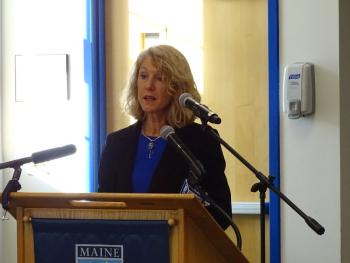 Maine House of Representatives candidate elect Vicki Doudera speaks at the DOT hearing. (photo by Erica Thoms)
Maine House of Representatives candidate elect Vicki Doudera speaks at the DOT hearing. (photo by Erica Thoms)
 Maine Representative Owen Casas, I-Rockport, speaks against Tariff No. 8. (photo by Erica Thoms)
Maine Representative Owen Casas, I-Rockport, speaks against Tariff No. 8. (photo by Erica Thoms)
 (photo by Erica Thoms)
(photo by Erica Thoms)
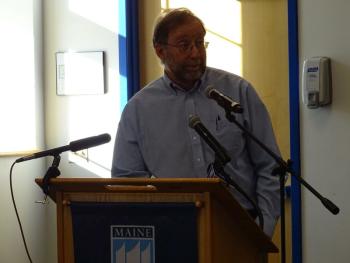 Ken McKinley, of Rockport, addresses the room. (photo by Erica Thoms)
Ken McKinley, of Rockport, addresses the room. (photo by Erica Thoms)
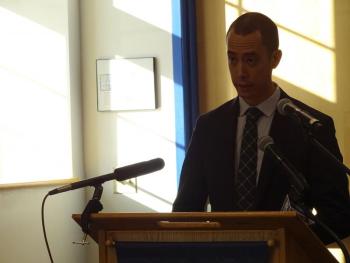 Lincolnville selectman Josh Gerritsen speaks to the crowd. (photo by Erica Thoms)
Lincolnville selectman Josh Gerritsen speaks to the crowd. (photo by Erica Thoms)
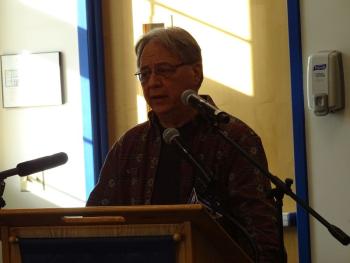 Bob Falciani, chairman of the Camden Select Board. (photo by Erica Thoms)
Bob Falciani, chairman of the Camden Select Board. (photo by Erica Thoms)
 (photo by Erica Thoms)
(photo by Erica Thoms)
 Jordy Watson, of Islesboro, speaks out against Tariff No. 8. (photo by Erica Thoms)
Jordy Watson, of Islesboro, speaks out against Tariff No. 8. (photo by Erica Thoms)
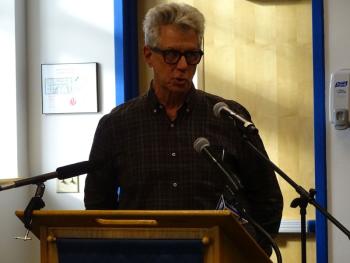 Roger Heinan, who moved to Islesboro in the 90s, takes to the podium. (photo by Erica Thoms)
Roger Heinan, who moved to Islesboro in the 90s, takes to the podium. (photo by Erica Thoms)
 (photo by Erica Thoms)
(photo by Erica Thoms)
 Andrew Doyle, the town manager in Vinalhaven, speaks in support of Islesboro. (photo by Erica Thoms)
Andrew Doyle, the town manager in Vinalhaven, speaks in support of Islesboro. (photo by Erica Thoms)
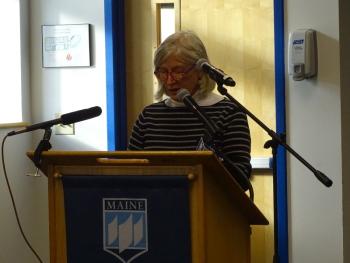 Islesboro resident Nancy Alexander speaks. (photo by Erica Thoms)
Islesboro resident Nancy Alexander speaks. (photo by Erica Thoms)
 Doug Welldon, who has family roots on the island, speaks to the crowd. (photo by Erica Thoms)
Doug Welldon, who has family roots on the island, speaks to the crowd. (photo by Erica Thoms)
 District 11 Senator Elect Erin Herbig listens amongst the crowd during the meeting. (photo by Erica Thoms)
District 11 Senator Elect Erin Herbig listens amongst the crowd during the meeting. (photo by Erica Thoms)
 Paul Hatch, who owns a construction company on Islesboro talked about the increased cost to do business. Hatch said the price to take two business trucks to the mainlaind per day has grown from $66,240 for a year of trips, to over $99k post rate-hike. (photo by Erica Thoms)
Paul Hatch, who owns a construction company on Islesboro talked about the increased cost to do business. Hatch said the price to take two business trucks to the mainlaind per day has grown from $66,240 for a year of trips, to over $99k post rate-hike. (photo by Erica Thoms)
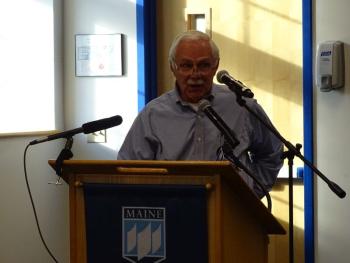 William Warren, a real estate broker on Islesboro for the last 30 years and resident of the island, expresses his concerns. (photo by Erica Thoms)
William Warren, a real estate broker on Islesboro for the last 30 years and resident of the island, expresses his concerns. (photo by Erica Thoms)
 (photo by Erica Thoms)
(photo by Erica Thoms)
 John Mitchell, who said he was born on the island before the ferry service began in 1936, also voiced concerns over Tariff No. 8. (photo by Erica Thoms)
John Mitchell, who said he was born on the island before the ferry service began in 1936, also voiced concerns over Tariff No. 8. (photo by Erica Thoms)
 (photo by Erica Thoms)
(photo by Erica Thoms)
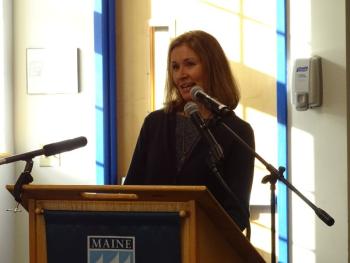 An Islesboro teacher addresses the crowd, which included a number of island students. (photo by Erica Thoms)
An Islesboro teacher addresses the crowd, which included a number of island students. (photo by Erica Thoms)
 (photo by Erica Thoms)
(photo by Erica Thoms)
 (photo by Erica Thoms)
(photo by Erica Thoms)
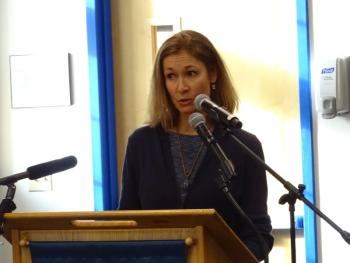 (photo by Erica Thoms)
(photo by Erica Thoms)
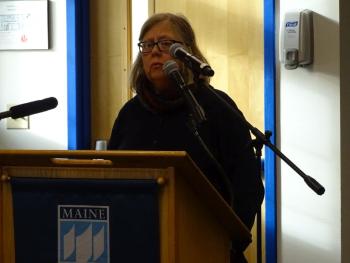 (photo by Erica Thoms)
(photo by Erica Thoms)
 (photo by Erica Thoms)
(photo by Erica Thoms)
 (photo by Erica Thoms)
(photo by Erica Thoms)
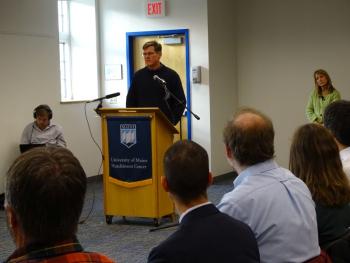 (photo by Erica Thoms)
(photo by Erica Thoms)
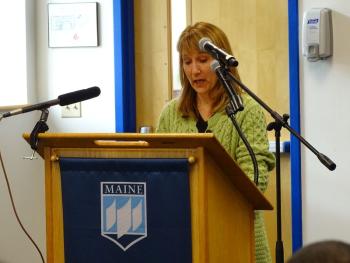 (photo by Erica Thoms)
(photo by Erica Thoms)
 (photo by Erica Thoms)
(photo by Erica Thoms)
 (photo by Erica Thoms)
(photo by Erica Thoms)
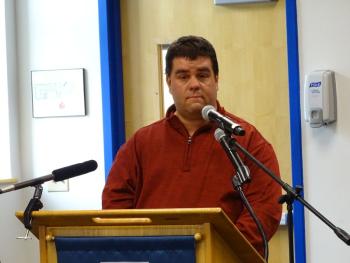 (photo by Erica Thoms)
(photo by Erica Thoms)
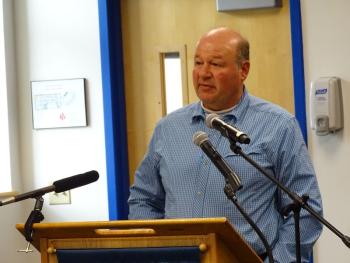 (photo by Erica Thoms)
(photo by Erica Thoms)
 (photo by Erica Thoms)
(photo by Erica Thoms)
 (photo by Erica Thoms)
(photo by Erica Thoms)
 (photo by Erica Thoms)
(photo by Erica Thoms)
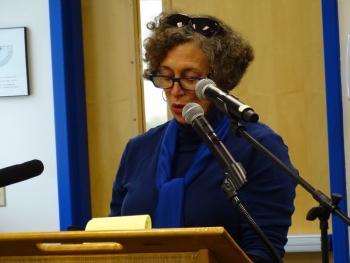 (photo by Erica Thoms)
(photo by Erica Thoms)
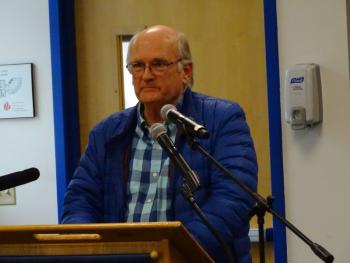 (photo by Erica Thoms)
(photo by Erica Thoms)
 (photo by Erica Thoms)
(photo by Erica Thoms)
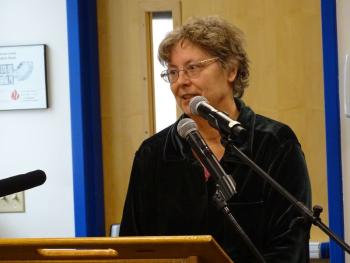 (photo by Erica Thoms)
(photo by Erica Thoms)
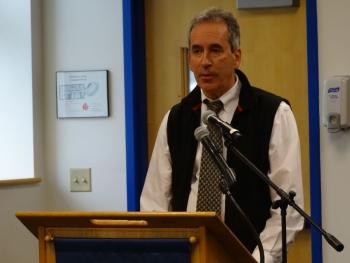 Belfast City Manager Joe Slocum was the last speaker at the meeting. (photo by Erica Thoms)
Belfast City Manager Joe Slocum was the last speaker at the meeting. (photo by Erica Thoms)
 Islesboro residents trekked over to Belfast on two buses and in cars. (Photo by Lynda Clancy)
Islesboro residents trekked over to Belfast on two buses and in cars. (Photo by Lynda Clancy)
BELFAST — More than 200 citizens, mostly from Islesboro but more than handful from neighboring mainland towns, as well as selectmen from Vinalhaven and North Haven, state legislators and a county commissioner, settled into a Maine Dept. of Transportation public hearing Nov. 28, with written and oral testimony, 99 percent of it critical of the DOT’s Tariff No. 8, a rate hike effected last May that doubled ferry ticket prices for Islesboro. Now, it is up to DOT Commissioner David B. Bernhardt, or his successor, if incoming Gov. Janet Mills changes leadership at the transportation agency, to reconsider the new rate structure.
After that, a Kennebec County Superior Court judge is also to review the case again on January 7 in a conference call, as the island community of Islesboro legally takes on decision making at the DOT.
And at the Maine House of Representatives, at least two representatives, Jan Dodge, D-Belfast, and recently elected Vicki Doudera, D-Camden, both said they will be working on bills to, “resolve the rate problem,” said Dodge.
Doudera said Nov. 30: “I feel one size does not fit all and that the Maine State Ferry Service’s current approach penalizes Islesboro for being close to the mainland. I feel that a fairer approach is a ferry toll system based on distance traveled, such as is used in Europe and Alaska. I have put in a bill to make that change.”
Last week, two DOT staff members — Ferry Service Manager Mark Higgins and DOT legal counsel Jim Billings — took the brunt of citizen frustration, sitting behind a small desk for two-plus hours at the front of a University of Maine Hutchinson Center meeting room. Fortified with Diet Coke and water, they remained relatively implacable, until everyone in the room had a chance to have a say in the DOT-hosted hearing.
“Where is the DOT Commissioner,” asked one Islesboro resident, who was joined by others who were vocal in wanting to know why more DOT officials were not present at a meeting that illustrated so much regional concern.
There was no answer for that, but DOT Counsel Billings, who was leading the hearing, said six department employees had attended the hearing, and that the process known as rule-making was running its course.
At issue is the now six-month old revised ferry ticket rate structure implemented by the DOT in May. New ferry ticket prices were released April 17, when the DOT, through the Maine State Ferry Service office, announced that it would implement a flat rate ticket pricing structure May 21, standardizing ferry prices across the entire system.
That system includes not just the ferry Margaret Chase Smith, which transports the public to and from Islesboro, but other ferries running to Frenchboro, Matinicus, Vinalhaven, North Haven and Swans Island.
Islesboro is the closest of Maine’s islands served by the state-owned ferry service, just three miles from Lincolnville Beach. But Islesboro saw the steepest increase with ticket prices, and while its citizens were in Belfast objecting to the hefty hike, they also disputed the process by which the DOT had arrived at its new prices – using adjudicatory procedure, not a rule-making process.
It started in January 2018, when the ferry service, which lies under DOT purview and is infrastructure owned by the State of Maine, said it was time to adjust the ferry ticket prices. Few in the public objected to that, and islanders attended several ferry meetings held by the DOT to gather feedback about its proposed tariff schedules.
In February, the DOT presented a different proposed tariff, but because it established different rates for in-state and out-of-state residents, island citizens rejected that idea, saying it would drive a wedge between the summer residents and year-round residents, all who economically depend on each other.
“At the public hearings held in January/February, the MSFS proposed a new rate structure with in-state/out-of-state fares. Islanders and seasonal residents from all the islands opposed this option as it unequally targeted nonresidents who owned property on the islands and would be very difficult to manage as proof of residency would be needed to determine the ticket price. One common suggestion made by each island during the process was a flat across the board rate increase be 15 percent to meet the budget shortfall.”
Maine State Ferry Service representatives returned to Augusta, and no more public meetings were held.
The Ferry Service then produced Tariff No. 8, which set the new flat rate across the ferry system. But the adjustment resulted in the doubling in price of Islesboro tickets; in effect raising ticket prices 100 percent for Islesboro passengers while reducing ticket prices for some of the islands.
Tariff No. 8 had not been vetted at the winter public meetings and islanders, in particular Islesboro residents, were surprised, and frustrated.
Despite a loud outcry from Islesboro citizens, many of whom commute to the mainland to work, or medical trips and to shop, and despite municipal support in the way of letters from the Belfast City Council, and well as select boards of Lincolnville, Camden and Rockport, the Ferry Service stuck to its Tariff No. 8, and effected the new ticket structure May 21.
Islesboro took the ferry service to court last summer, asking the court to vacate the new ferry price hikes and require the DOT to initiate rule-making process with the ferry rate structure.
The DOT had maintained, that the new tariffs do not constitute a rule change, and used adjudicatory processes allowed under the Administrative Procedure Act.
But Islesboro’s attorney, Mary Costigan, countered that the DOT acted in error. “MDOT was required, pursuant to 5 M.R.S.A. § 8052(5)(A),[state statute governing rule making] to adopt a written statement explaining the factual and policy basis for the rule, listing the names of persons whose comments were received, and addressing the specific comments and concerns raised.”
In early November, Kennebec County Superior Court Judge M. Michaela Murphy did not rule to reverse the ferry ticket rate hikes of May 21, 2018, but she ordered the DOT to conduct rule-making on the tariff, as opposed to solely putting the new tariff in place through use of the adjudicatory process.
She called for a stay on all proceedings until Jan. 1, 2018, or whenever the rule-making proceedings for Tariff No. 8 are completed, whichever comes first.
With the judge’s decision, the DOT was forced to hold its hearing, and accept comments through a prescribed time, which it did, on Nov. 28.
December 12 is the deadline for submitting written comments on the proposed rule. After that, DOT will be reviewing those comments, as well as the comments made at the Nov. 28 public hearing in Belfast.
Following review, DOT will decide whether to adopt the proposed rule, either as originally proposed or as modified in response to comments. As part of the rulemaking process, DOT will address, in writing, the comments it has received. The DOT has 120 days from December 12 to review the comments and make its decision.
“The Commissioner makes the final decision,” said Billings, after the Nov. 28 hearing.
Rulemaking follows state law as outlined under the Maine Administrative Procedure Act.
To submit comments, data or arguments, send them by Dec. 12 to:
James Billings, Esq.
Legal Division, Maine Department of Transportation
16 State House Station, Augusta, ME 04333-0016
Telephone (207) 624-3020, TTY Users dial Maine Relay 711
Nov. 28 hearing
Islesboro took the DOT hearing seriously, planning well in advance, coordinating letter-writing campaigns, lining up residents to speak, and circulating Nov. 28 travel information. The town sequestered two school buses and came across Penobscot Bay on the Margaret Chase Smith. Others took the independent Quicksilver and Little Dipper water taxi service, carpooling to the UMaine Hutchinson Center, where the parking lots quickly filled.
Citizens, select board members and councilors — including those from Islesboro, as well as Belfast, Camden, Lincolnville and Rockport — county commissioners, public health officials, teachers, business owners — they took turns at the podium, delivering strong testimony as to how Tariff No. 8 affected their personal lives, as well as the larger public.
They did not mince words.
Phil Crossman, a selectman from Vinalhaven, whose own grandfather, Ted Maddox, had a hand in creating the ferry service, spoke about the history of the ferry service board.
Crossman said “I look froward to the day when the six island communities can speak with one voice,” and he said he was sorry that he did not speak up last spring when it was clear that Islesboro, “was being treated unfairly.”
Joe Slocum, who has been a Castine town manager and lives in Belfast, said the tariff was punitive, and encouraged the ferry service to return
“There’s more than just a service here that’s just an issue, and it is a lifeline at issue,” he said. “This is a state of Maine issue. We need to preserve our culture and history.”
John Oldham, a resident of Islesboro and a music teacher, who has also been a janitor and postal worker, “to get by” while building his home.
“In our present shared task of finding solutions, I see necessity as the mother of invention, through innovation and cooperation, not heavy-handed, top-down policy designed to create divisiveness pitting one island against another.”
He said: “Route 173 doesn’t stop at the ferry dock. It’s connected to continued state-maintained roads by the ferry. This is highway robbery.”
Oldham also said the DOT sees “a golden goose to squeeze then cynically cry ‘foul’ with the threat of a surcharge to make up a deficit you indirectly created when we are forced to find ways to live with your rate hike.”
Results of the rate hike
While Jim Billings said the rates were proposed — for the purpose of the hearing — they have been in effect since last May, and according to Ferry Service Manager Mark Higgins, “The new tolls are working.”
He explained the budgetary structure of the ferry service, which counts on 50 percent of funding to derive from the state’s highway fund and 50 percent from tolls.
Capital improvements are funded by the Maine taxpayer, he said.
However, the imbalance had spread, with 73 percent of the overall ferry service costs deriving from the highway fund and the remaining balance from fees; hence, the increase in ticket prices.
Higgins said the tolls are to cover the gap and if not, the DOT has built into Tariff No. 8 a proposed surcharge.
“The MSFS may impose a surcharge on any or all of the tolls set forth herein in response to increases in the operating costs of the MSFS and/or to decreases in ridership,” the DOT stated in its rule making for the tariff.
To cover that gap, said Higgins, is “more than cutting a run or two.”
It would require altering the level of service provided.
But Islesboro select board member Gabe Pendleton countered Higgins’ assertions, saying that while island residents expect ticket prices to increase, “we expect to be part of the process” with input from all the islands to come up with fair structure.
And, he said, while prices have increased since last spring, ridership on the Margaret Chase Smith is down, approximately 15 to 25 percent.
“As a result of the high fares, many people have significantly reduced their off-island trips, which impacts mainland businesses,” wrote Islesboro selectmen Archibald Gillies and Pendleton. “If feasible, many people leave cars on the mainland walk onto the ferry to minimize costs. A decrease of 14 percent was reported by the ferry service in adult fares in July and August compared to 2017, and a further decrease of 28 percent in September and October. Vehicle use dropped 11 percent in July and August, and 17 percent in September and October.”
There won’t be, Pendleton said, the ridership needed to cover the budget shortfall.
And, he said, the loss of ridership has resulted in the same budget shortfall that existed before the rate change.
He advised the ferry service to, “go back to drawing board,” determine the cost of operating the service, share that information with all the islands and solicit input. Then, set rates, he said.
“Get it right for all the islands,” said Pendleton.
In a prepared statement from the Town of Islesboro, which was a plaintiff in the lawsuit, the community anticipated a rate increase since implementation of the previous Tariff No. 7 in 2012.
The town also compared Maine’s ferry service to that of the State of Washington, which is a “service that has worked hard to be transparent in the development of fare rates across the ferry system and tracks operational costs for each ferry route.”
Modernize the system, Islesboro is collectively suggesting to the DOT. Design more fuel efficient ferries. Enlist experts. And, the community is suggesting to the DOT: analyze the entire system.
Reach Editorial Director Lynda Clancy at lyndaclancy@penbaypilot.com; 207-706-6657
Background
According to Islesboro, Tariff No. 8 was different from the rate structure proposed by the DOT last winter, which had been vetted at public hearings. That structure established different rates for in-state and out-of-state residents.
Island citizens rejected that idea, saying it would drive a wedge between the summer residents and year-round residents, all who economically depend on each other.
That was in January and February 2018.
Maine State Ferry Service representatives, who are considered part of the DOT, returned to Augusta, and no more public hearings were held.
New ferry ticket prices were released April 17, when the DOT, through the Maine State Ferry Service office, announced that it would implement a new flat rate ticket pricing structure May 21, standardizing ferry prices across the entire system.
Adjusting the ticket prices for flat rates, however, resulted in Islesboro tickets doubling in price and threatening, according to residents and municipal officials, local commerce and trade on Islesboro and the Midcoast communities that lie but one mile across Penobscot Bay.
Belfast, Lincolnville, Camden and Rockport all wrote to the DOT asking the state agency to reconsider the Islesboro rates and discuss the issue.
But the DOT, and the governor’s office, refused to communicate further with Islesboro and legislators, who attempted to talk about the new rates with staff. The DOT denied a request for a stay of their ferry fee schedule implementation.
Read: Maine DOT refuses to postpone ferry ticket increase; Islesboro to forge ahead with appeal
“MDOT did not hold any public hearings on the rate structure that was ultimately adopted, even though the adopted rate structure was substantially different than the proposed rate structure,” wrote Islesboro’s attorney, Mary Costigan, in the appeal.
Tariff No. 8 became effective May 21, she wrote, “only 38 days after the decision was signed by the Commissioner and less than one month after the decision was received by the Town.” It was not approved by the Attorney General prior, she added.
The DOT has said, however, that the new tariffs do not constitute a rule change, and used adjudicatory processes allowed under the Administrative Procedure Act.
But Costigan countered that the DOT acted in error.
“MDOT was required, pursuant to 5 M.R.S.A. § 8052(5)(A),[state statute governing rule making] to adopt a written statement explaining the factual and policy basis for the rule, listing the names of persons whose comments were received, and addressing the specific comments and concerns raised.”
Costigan calls the tariff on Islesboro’s end a revenue-raising device that is not calculated with a fair approximation of the costs to government and the benefit to the individual of the services, “and therefore constitutes a tax on petitioners.”
“The Maine Constitution requires that all taxes be initiated by the Maine House of Representatives,” Costigan wrote.
Islesboro wanted the court to void Tariff No. 8, and declare it an arbitrary, capricious and unfair approximation of the Islesboro ferry’s cost to the government and benefit to ferry users, thus constituting an illegal taxation without representation.
Tariff No. 8
A) Passengers.
Type Toll
1. Adult Round Trip
(age 12 and up) $11
2. ChildRoundTrip
(age 5 to 11) $5.50
3. Children Under 5 Free B) Automobiles (and certain other vehicles).
Type Toll
1. RoundTrip $30.00
2. This toll is for vehicles with four (4) tires or less, with an overall length (including cargo) of twenty (20) feet or less, that are one of the following types: automobiles, station wagons, motorcycles, vans, mini-vans, pickup trucks, golf carts, fork lifts, riding lawn mowers, small garden tractors, all-terrain vehicles, and electric vehicles.
3. This toll includes the driver of the vehicle but does not include accompanying passengers.
C) Trucks (and certain other vehicles).
Type Toll
1. One Way or Round Trip $2.50/foot
17-229 Chapter 602 1
2. This toll is for vehicles with more than four (4) tires or with an overall length (including cargo) of more than twenty (20) feet or that are not one of the following types: automobiles, station wagons, motorcycles, vans, mini-vans, pickup trucks, golf carts, fork lifts, riding lawn mowers, small garden tractors, all-terrain vehicles, and electric vehicles.
3. This toll does not include the driver of the vehicle or accompanying passengers.
D) Bicycles. Type
- Adult Round Trip (ages 12 and up)
- ChildRoundTrip (ages 11 and under)
3. These tolls do not include the rider.
Toll $20.00
$10.00
Section 3: SURCHARGES. The MSFS may impose a surcharge on any or all of the tolls set forth herein in response to increases in the operating costs of the MSFS and/or to decreases in ridership.
A) At least 21 days before a surcharge takes effect, the MSFS shall give notice to the public by publishing notice of the surcharge in a newspaper of general circulation in the area affected, and by posting notice of the surcharge in the following locations:
- AteachMSFSterminal;
- OneachMSFSvessel;
- In the municipal building or some conspicuous public place in each of the following:
- Frenchboro
- Islesboro
- Matinicus
- NorthHaven
- Swan’s Island
- Vinalhaven
B) A surcharge may remain in effect for a period of no longer than 180 days. If, at the expiration of 180 days the circumstances warranting the surcharge continue, the MSFS may renew the surcharge for one additional period of 180 days.
17-229 Chapter 602 2
STATUTORY AUTHORITY: 23 M.R.S. §§ 52 and 4404; Resolves 2015, Chapter 86.
Event Date
Address
United States


